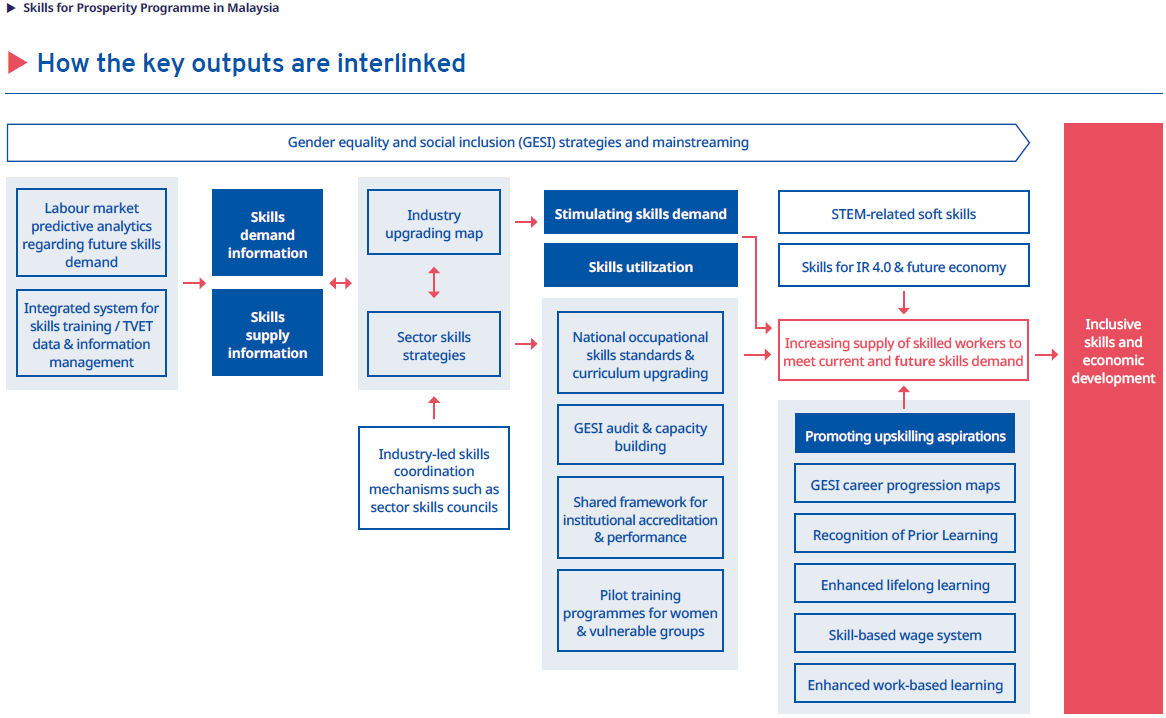INTERNATIONAL LABOUR ORGANIZATION (ILO):
The only tripartite U.N. agency, since 1919 the ILO brings together governments, employers and workers of 187 member States, to set labour standards, develop policies and devise programmes promoting decent work for all women and men. The Regional Office in Bangkok supports work in 36 member countries. Teams of decent work specialists provide a range of technical services and expertise that support work throughout the region and provide assistance to the ILO’s constituents - Governments, workers and employers’ organizations. The ILO operates a wide range of programmes and projects in the Asia Pacific focusing on relief and development challenges. The overall purpose of this technical cooperation is to support the implementation of the Decent Work agenda in each country.
SKILLS, KNOWLEDGE AND EMPLOYABILITY
Transformative changes such as globalization, new forms of organizing work, and advances in automation and artificial intelligence (AI) have important implications for the world of work. This is everyone’s business: Governments, employers and workers all have a stake in skills development. Governments need to adopt more relevant skills policies to develop the skills required by rapidly evolving labour markets. Education and training systems will also need to take advantage of new educational technologies and give greater attention to digital skills.
ILO Implementation Plan 2030 Agenda for Sustainable Development
DSD & ILO COLLABORATION
DSD is the focol point for skills and member is Regional Skills Technical Working Group (RSTWG). DSD supports ILO's agenda related to skills development.
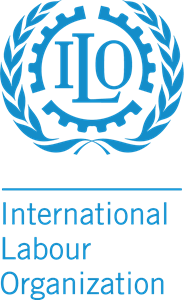

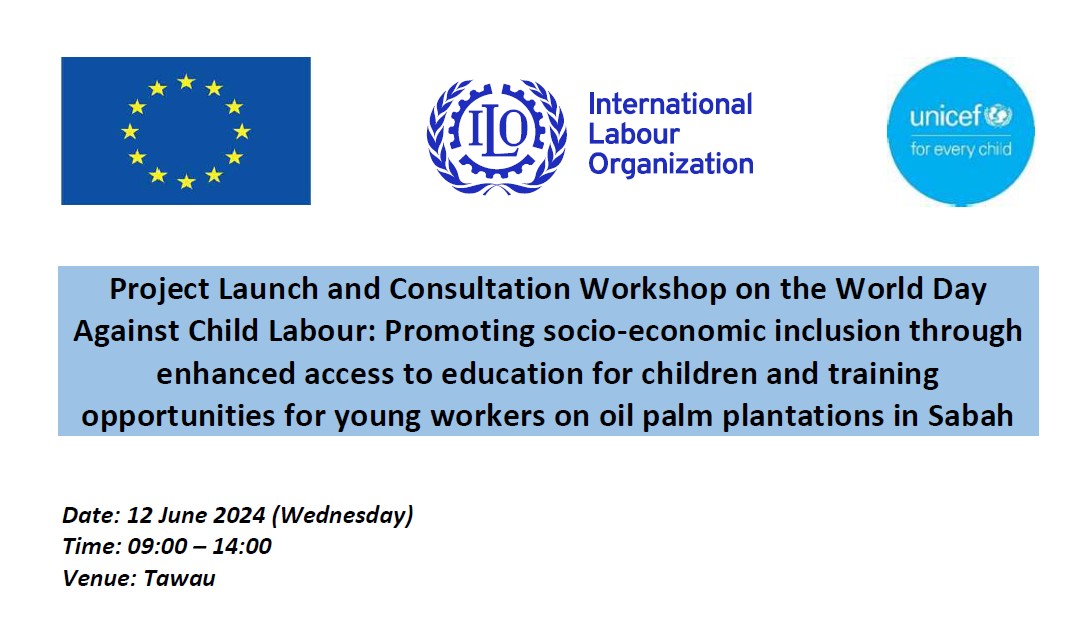

Project Launch and Consultation Workshop on the World Day Against Child Labour:
Promoting socio-economic inclusion through enhanced access to education for children and training opportunities for young workers on oil palm plantations in Sabah
The ILO and UNICEF has initiated the joint project entitled “Promoting socio-economic inclusion through enhanced access to education for children and training opportunities for young workers on plantations in Sabah”, funded by European Union.
The project will:
- increase understanding among key stakeholders, including government, employers’ organizations, media and other social partners on the issue of child labour in Sabah State, especially the negative effects of children of migrant parents working in the palm oil industry; and
- improve access to and participation in quality education for children and training opportunities for young workers living or working in and around oil palm plantations.
- Duration Project: June 2024 – Disember 2025.
1) Mdm. Nadiah Tulakmar Binti Kamarudin
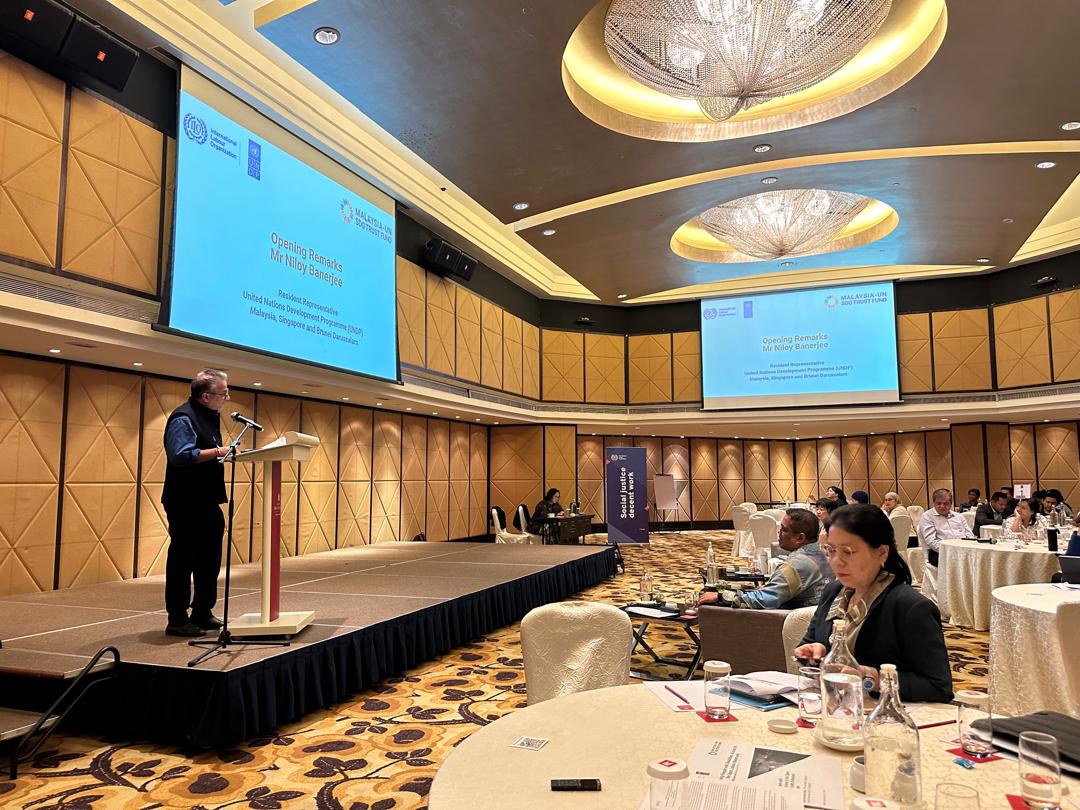
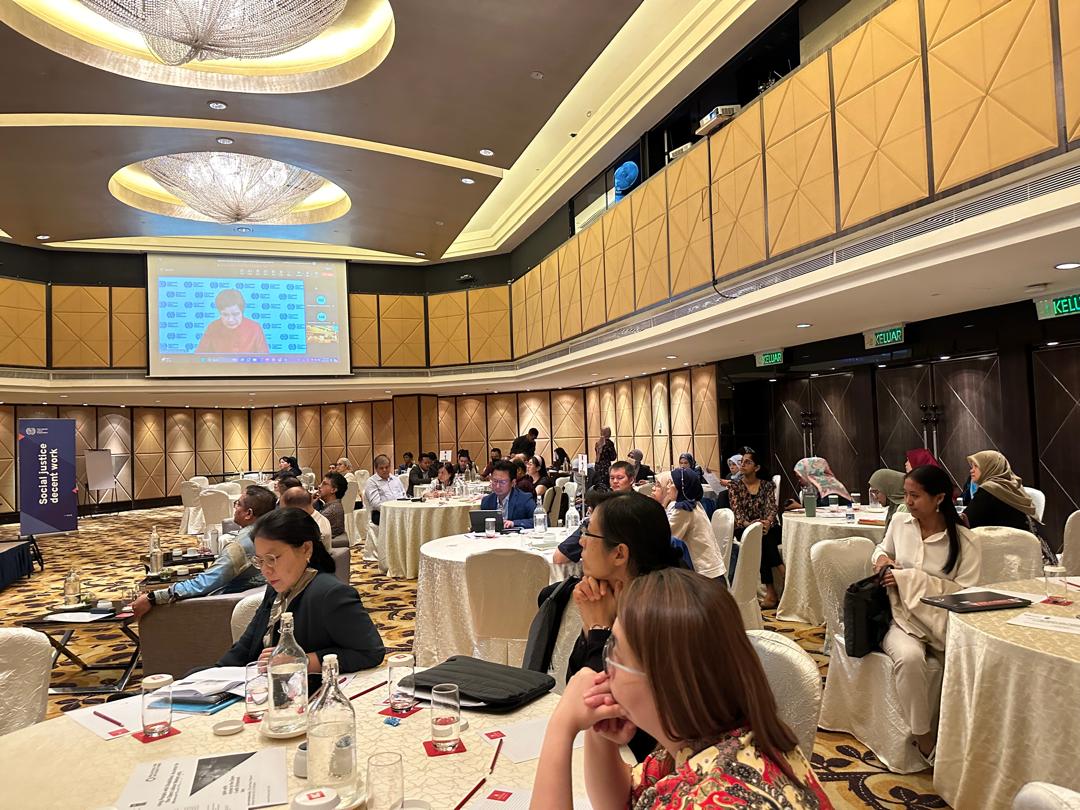
Workshop “Improving People with Disabilities’ (PWD) Access to the Open Labour Market with Enhanced Social Protection”
This project seeks to address the current challenges through a step-by-step approach. Firstly, through ensuring that the data on which analysis is based is the best possible. Secondly, by involving all stakeholders to initially identify challenges and current state of play and subsequently, in involving them in appropriate solutions. Thirdly, through innovative approaches and capacity building to address challenges (pilot scheme for employment, capacity building etc) and suggestion of appropriate solutions. ILO as the organizer look forward to sharing and discussing these issues with all the participants during this Inception Workshop.
Objectives for Inception Workshop:
i. To provide PWD with equitable opportunities in an open labour market to improve their standard of living and achieve self-sustainability
ii. To address gaps and barriers to businesses on the employment of PWD through capacity building
iii. To enhance workers with disabilities access to social protection schemes such as SOCSO and EPF
1) Dr. Muhamad Azuddin Bin Hassan
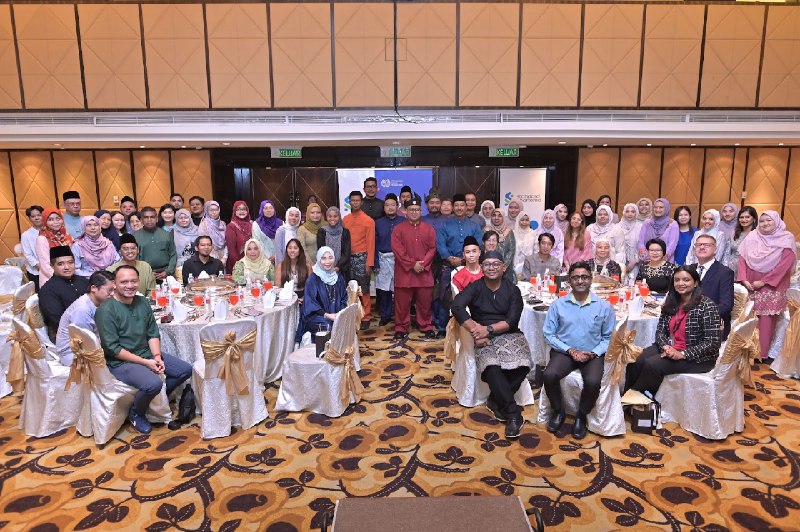
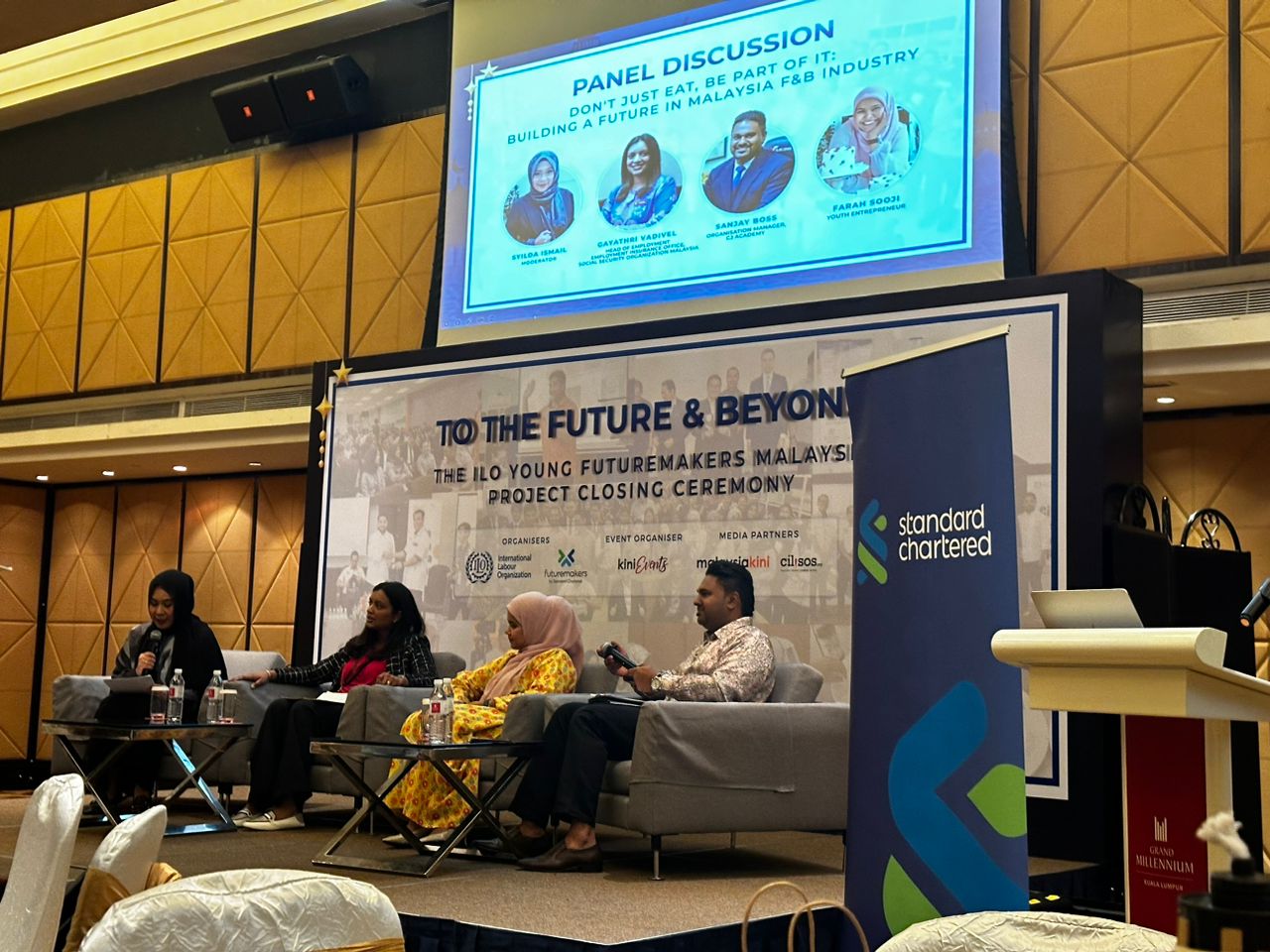
To the future & beyond: The ILO Young Futuremakers Malaysia Project Closing Ceremony
This closing ceremony presented the project’s findings and achievements throughout its lifespan as well as continue the discussion and engagements with key stakeholders in providing sustainable support and a comprehensive framework for youth employability in Malaysia.
The project takes an integrated approach to support the employability of young workers as well as technical vocational education and training (TVET) trainees and graduates with the aims:
- providing up/reskilling training opportunities with a focus on core skills towards their career advancement and
- Public awareness of skills development and career opportunities for the unemployed youth.
- The project aims to benefit youth from B40 or low-tier M40 communities in Kuala Lumpur, Selangor and Kedah with the target of up/reskilling training and employment opportunities in the food services sector.
Within 20 months, the project has implemented various initiatives to achieve its outcomes and objectives including public and online awareness campaigns, digital and communication skills training for young workers, technical skills training for TVET trainees, career fairs, bilingual career progression maps in the 3 food services sectors and many more. Through collaborations with diverse stakeholders in the industry, more than 1,200 youth received the benefits from the initiatives implemented by the project.
1) Mdm. Norhidayah Binti Mohd Hanapiah
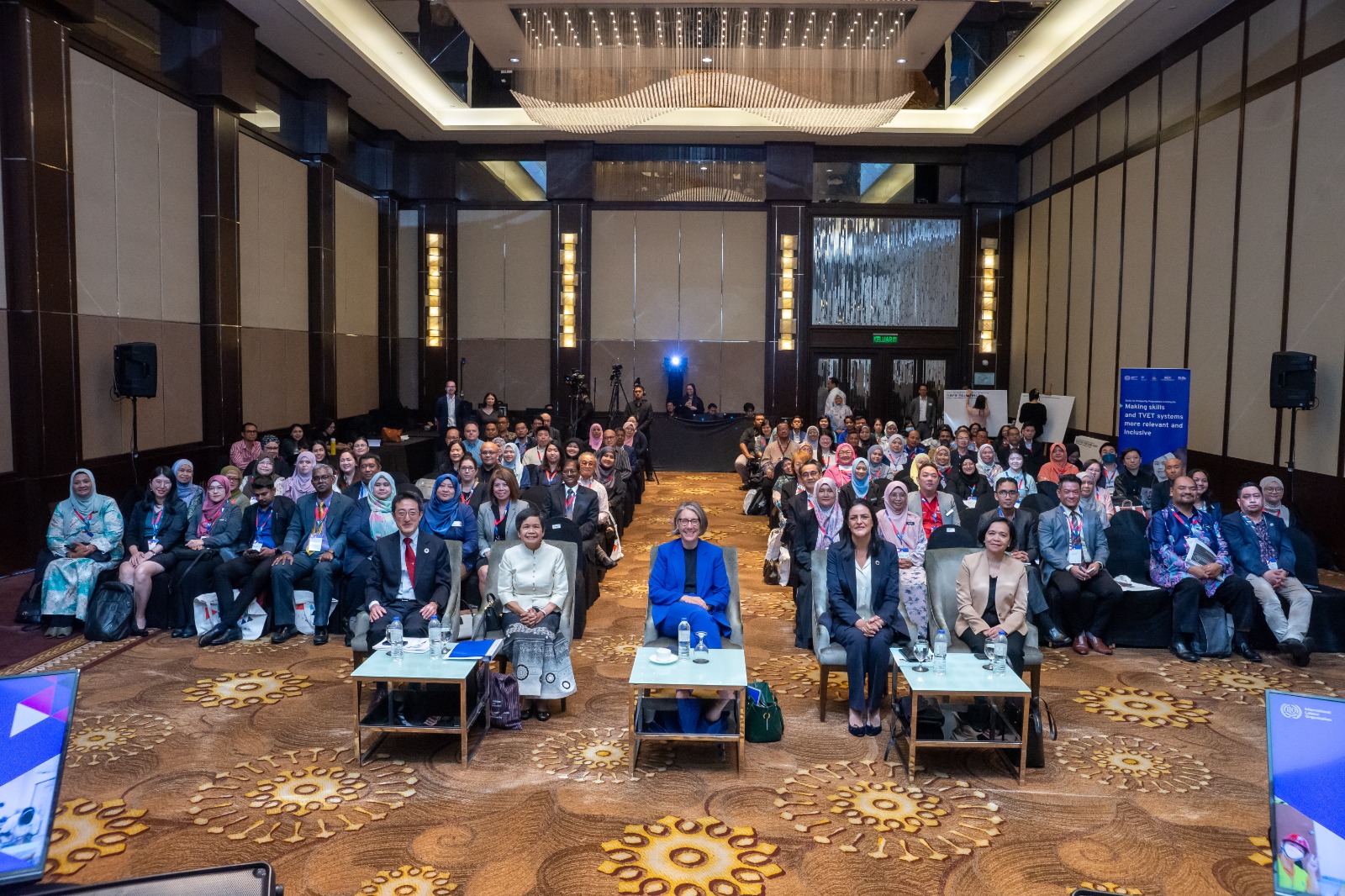
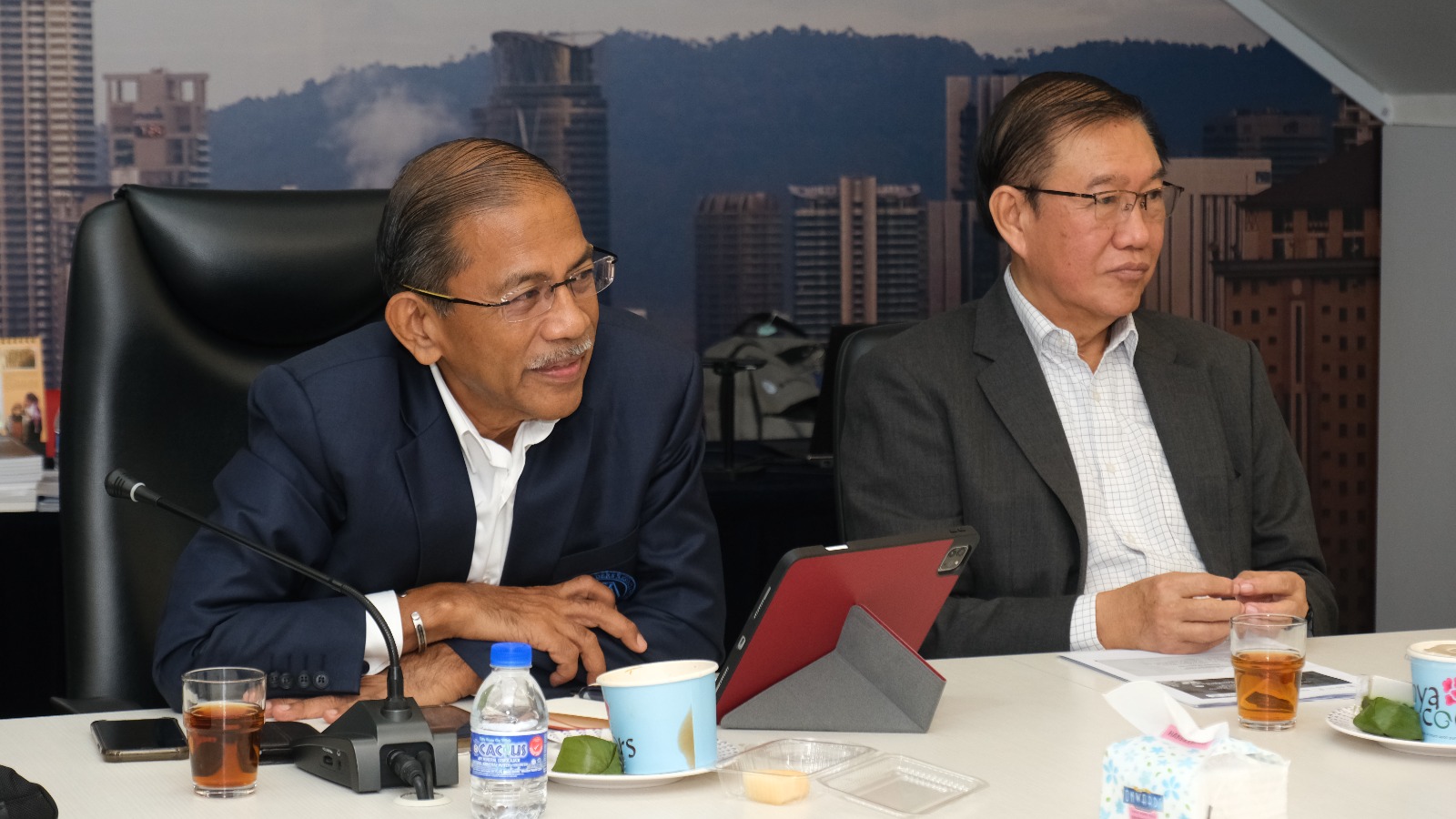
Final Dissemination: Skills for Prosperity in South-East Asia Programme (SfP-SEA) Closing Seminar
- This event was held by the ILO to extend their sincere thanks to all the partners and participants who have supported the Skills for Prosperity Programme in Malaysia (SfP-Malaysia) over the past three years.
- This cumulating event have shared the results achieved and discussed the opportunities for its sustainability along with the Ministry of Human Resources (MOHR), Malaysia Employers Federation (MEF), and other national partners.
- DSD awarded a Certificate of Appreciation in recognition of the organization's remarkable contributions to the implementation and sustainability of the Skills for Prosperity Programme in Malaysia.
1) Mdm. Norhidayah Binti Mohd Hanapiah
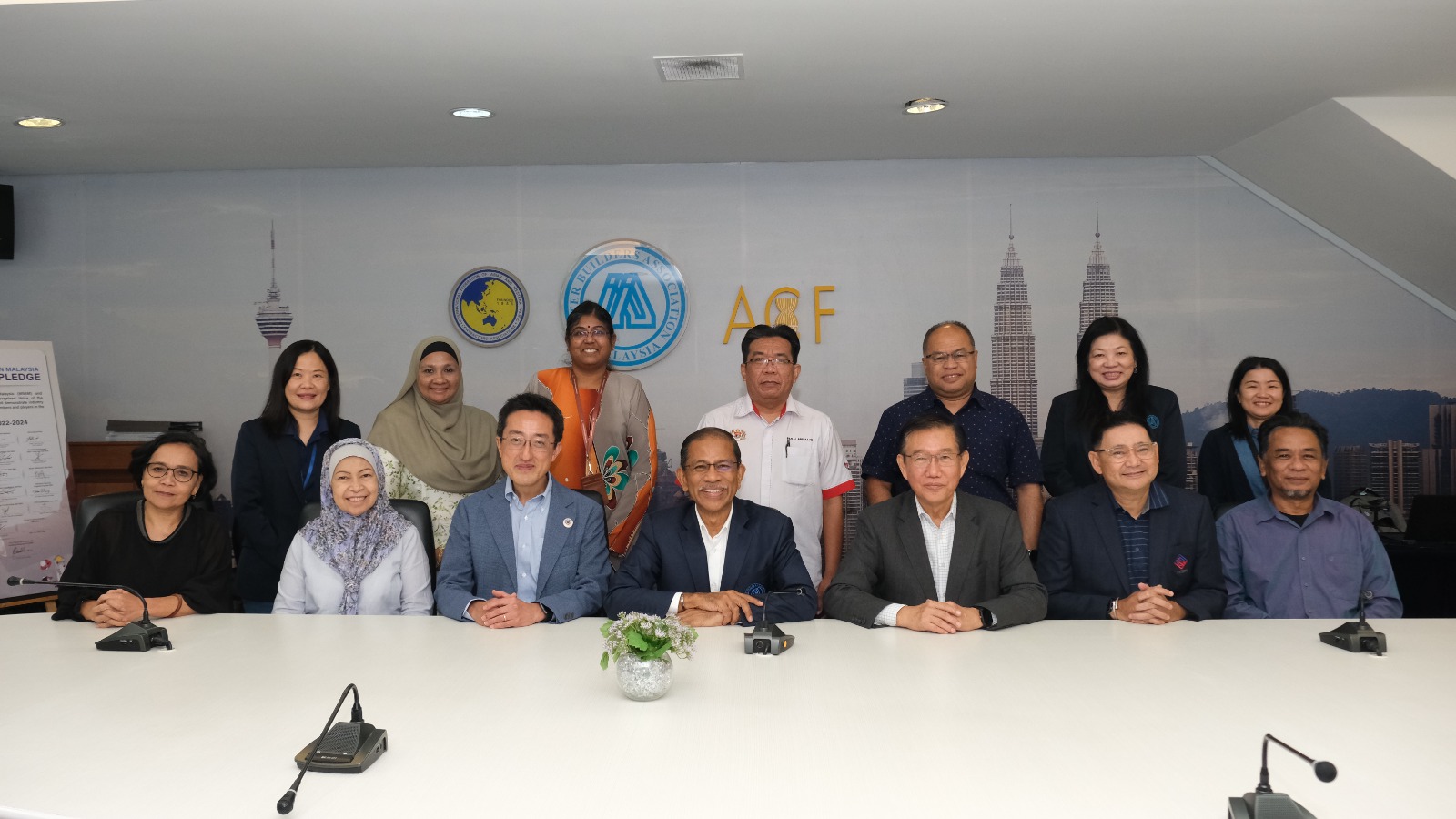
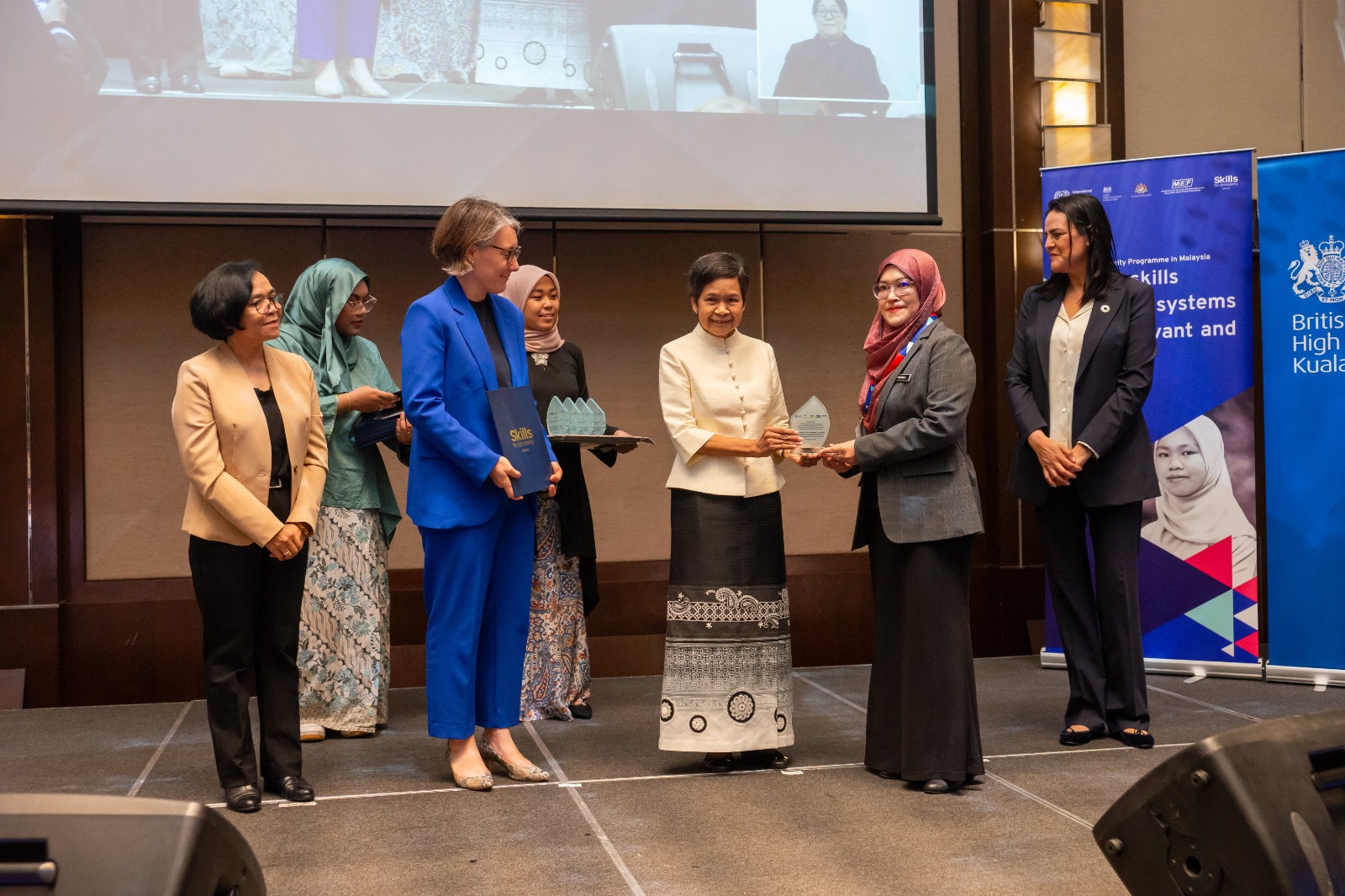
ILO and Master Builders Association Malaysia team up to increase employability and facilitate career progression of workers, particularly women and vulnerable youth. A partnership agreed between the ILO-UK Skills for Prosperity Programme in Malaysia (SfP-Malaysia) and MBAM, a leading association in Malaysia’ construction industry, will further enhance MBAM’s capacity as a skills body. It will also help the industry find the skilled workers it needs in traditional and emerging occupations.
Industrial Relations and Strategic Collaboration with MBAM for sustainable implementation of SSS & LS Programme and also expansion of accreditation and certification of other MBAM training programmes. Potential as Skills Sectoral Body.
1) Mdm. Meena a/p Ramalingam
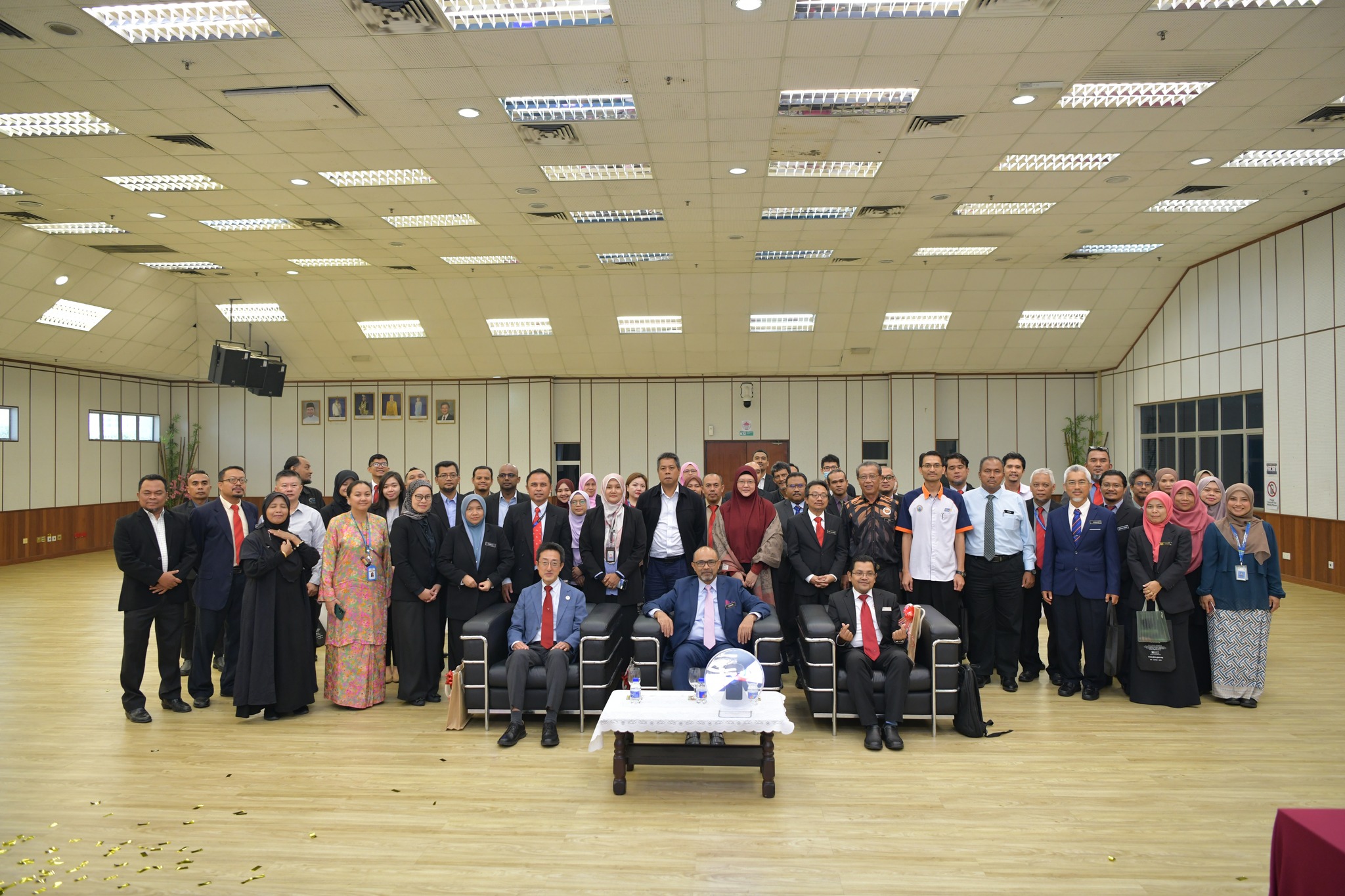
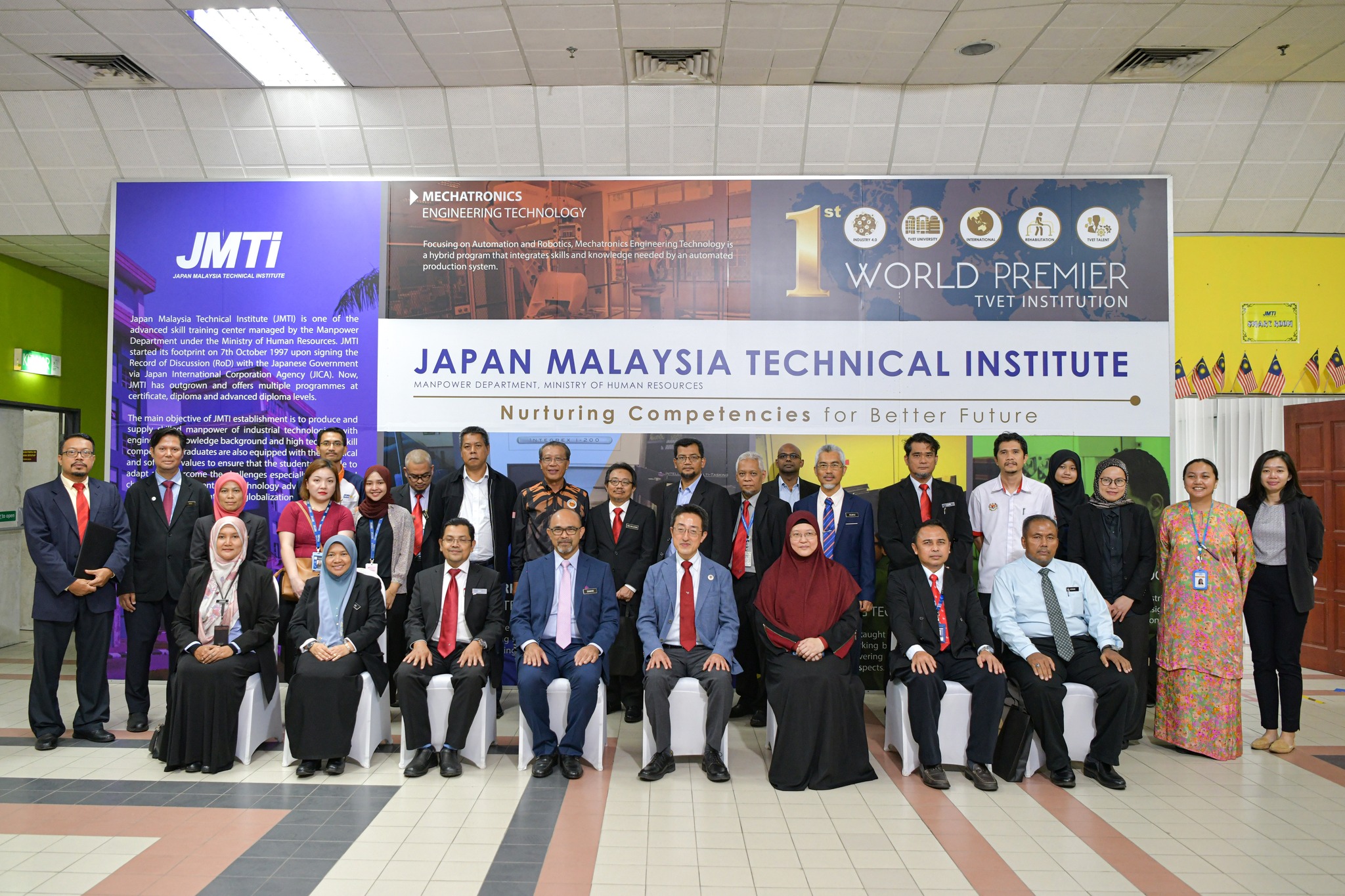
Coffee Table Booklet on Local Leading Cases for Digital Skills Development which highlights innovation projects based on industry 4.0 technology and digitization has been completed by the International Labor Organization (ILO). Projects developed by CIAST are also included in the book.
1) Mdm. Meena a/p Ramalingam
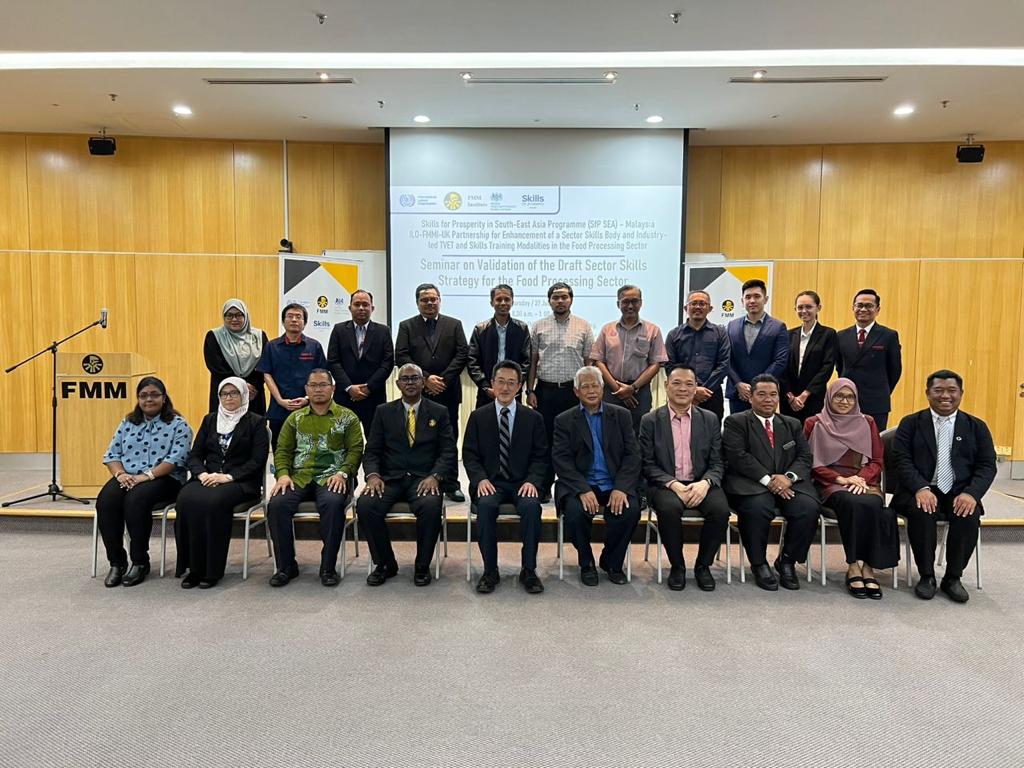
The Skills for Prosperity Southeast Asia Programme - Malaysia (SfP Malaysia), funded by the UK Government, aims to improve Malaysia’s capacity to achieve sustainable and inclusive growth through the enhancement of skills development and technical and vocational education and training (TVET) systems. The SfP Malaysia with FMMI has been developing an enhanced sector skills strategy for food processing sector. This strategy will contribute to increasing the supply of skilled workers who meet current and future sectoral demand.
Together with FMMI, the ILO Skills for Prosperity in Malaysia organised a seminar for validation of the draft sector skills strategy for food processing sector. The draft sector skills strategy was developed based on the outcomes of the STED workshop organised on 22nd - 24th November 2021. The purpose of this seminar is to gather feedback from the food processing industry and relevant public stakeholders on the draft sector skills strategy and provide recommendations for further enhancement.
1) Mr. Rohaizat Bin Ramli
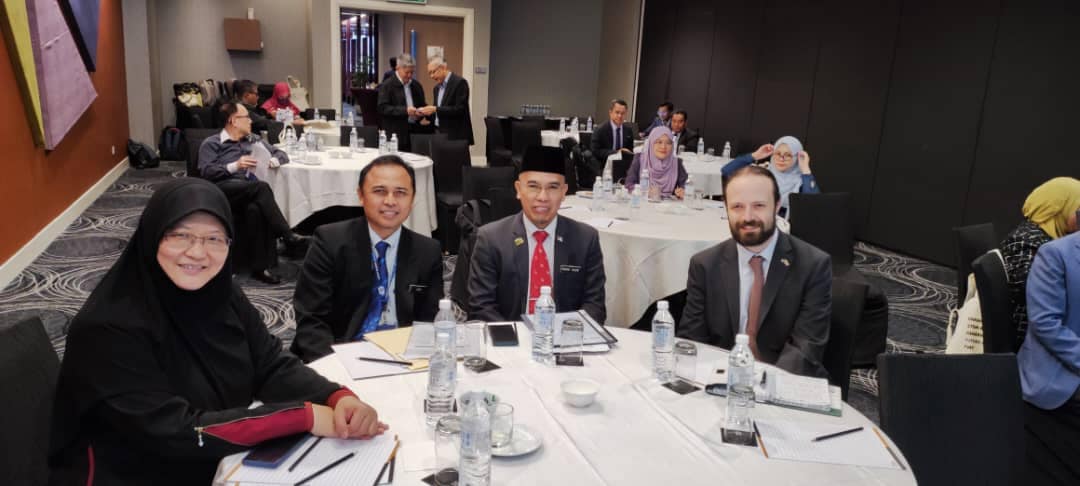
The Skills for Prosperity Southeast Asia Programme - Malaysia (SfP Malaysia), funded by the UK government has recently appointed Universiti Malaya (UM) as a national implementation partner to promote the integration of STEM-related generic skills to TVET/skills training programmes for the duration of 24 months from 16th August 2021 to 15th August 2023. The objective of this project is to promote the integration of generic skills related to STEM into TVET programs and skills training related to the construction and manufacturing sectors (particularly food processing).
In addition, to enhance employment opportunities and career advancement of TVET and skills trainees, particularly women and youth, to meet the skills needs of future employers, including those related to Industry Revolution 4.0 (IR4.0). The Skills for Prosperity Southeast Asia Programme - Malaysia (SfP Malaysia), aims to increase national capacity for inclusive economic growth through more future-ready TVET/skills training systems by promoting equality and diversity.
Therefore, main agenda of today’s program is validation the draft Sector Skills Strategy for the Construction Sector conducted with the aims to:
(i) share draft Sector Skills Strategy; and
(ii) validate the proposed recommendations to increase the supply of skilled workers who meet current and future sectoral demand.
The objective of the meeting is to promote an understanding of how STEM can be integrated into TVET and share the lessons learnt from the STEM pilots and module/guide developed from the projects such as the STEM framework and taxonomy, and the curriculum development guide. During the evening sessions, UM STEM will present a policy proposal on integrating STEM into TVET existing modules and a roundtable discussion to promote the policy will be conducted.
Reported by:
1) Mdm. Meena a/p Ramalingam
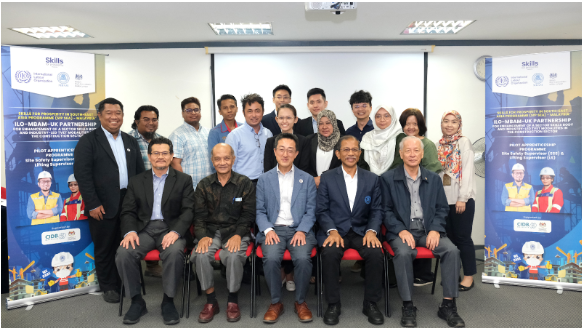
The SfP-Malaysia has been partnering with the Master Builders Association Malaysia (MBAM) to enhance the capacity of an industry-led sectoral skills body to deliver industry-led TVET/skills training modalities and to improve skills utilisation, employability, and career development paths of women and youth in the vulnerable groups in the construction sector.
The main objectives determined from this sector skills strategy for the construction sector are:
- To bring about a common vision and a comprehensive action plan for the sector’s skills development;
- Serving as a guidance for priority action recommendations and policy formulations to bridge existing skill gaps and
- Enhance productivity growth and international competitiveness of the sector.
Therefore, main agenda of today’s program is validation the draft Sector Skills Strategy for the Construction Sector conducted with the aims to (i) share draft Sector Skills Strategy; and (ii) validate the proposed recommendations to increase the supply of skilled workers who meet current and future sectoral demand.
Reported by:
1) Ts. Nurul Afifah Binti Mohd Zaid
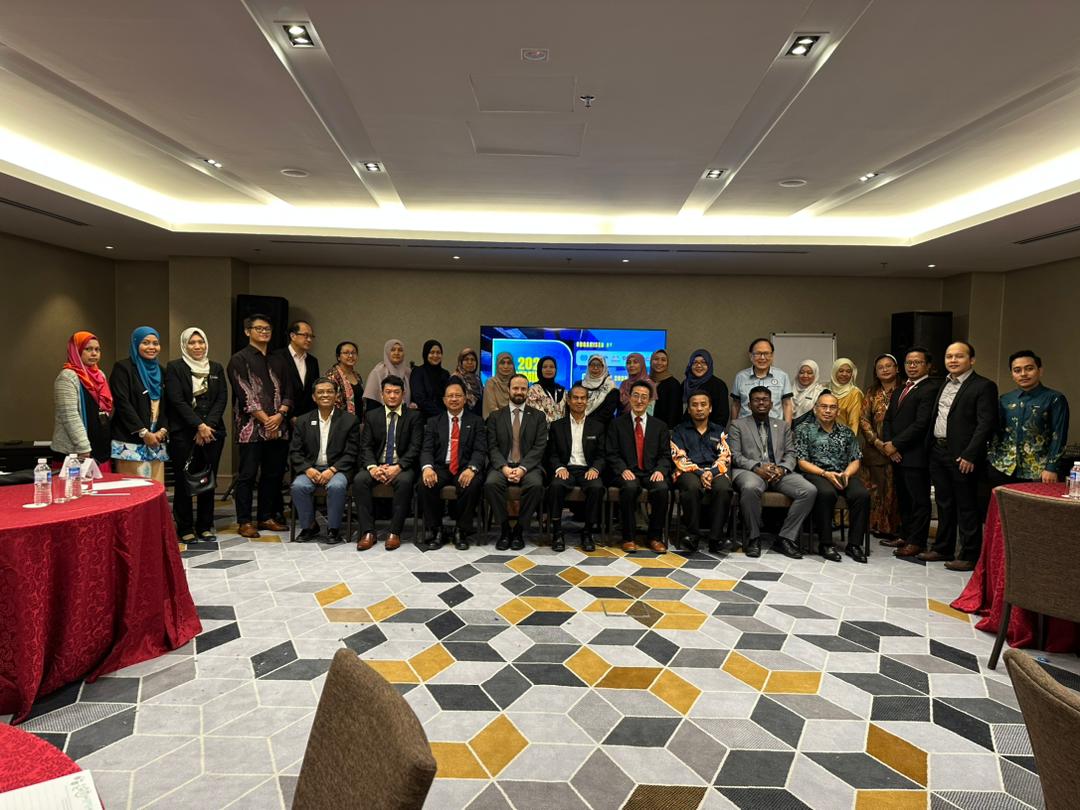
This comprehensive review of Malaysia’s Lifelong Learning Policies and Programmes conducted with the aims to understand current lifelong learning system in Malaysia and to identify gaps with the needs of workers and students from or in TVET and skills training through the methodology of Systematic Literature Review (SLR), Document Analysis and interview of the focus group.
There are 3 main objectives determined from this review:
- To Examine lifelong learning currently at play in Malaysia in terms of policy and regulatory framework, implementation mechanisms, and other supporting systems to facilitate lifelong learning as well as impacts of that learning.
- To assess and analyse the capacity of current policy and systems in meeting the renewed expectation on lifelong learning to support resilience and the transitions that people face throughout their working life.
- To suggest areas for improvement in policy, institutional arrangements and supporting mechanisms.
Therefore, the main agenda of today’s program is to share the findings of this report with training providers and industries to consider other opinions from different perspectives for the improvement before the report is officially endorsed.
Reported by:
1) Mrs. Norhidayah Binti Mohd Hanapiah
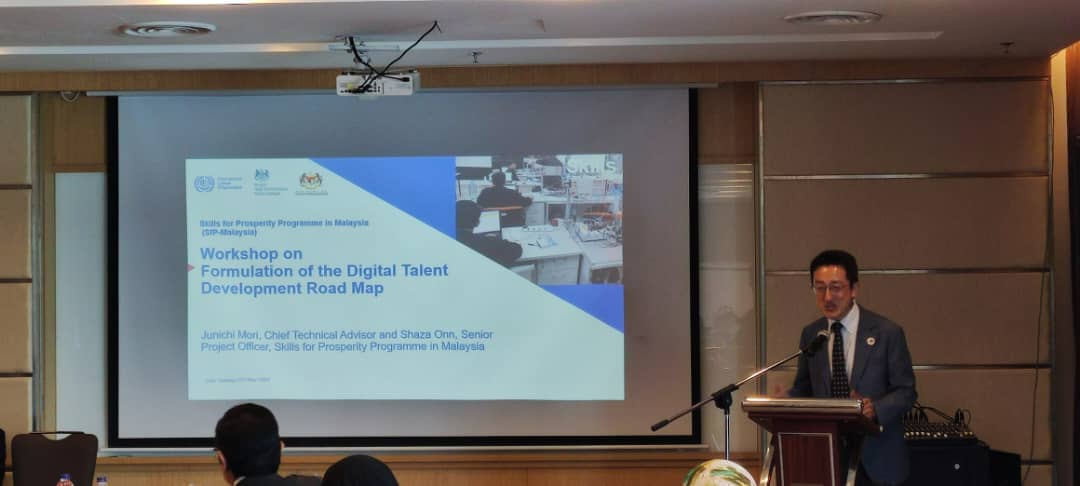
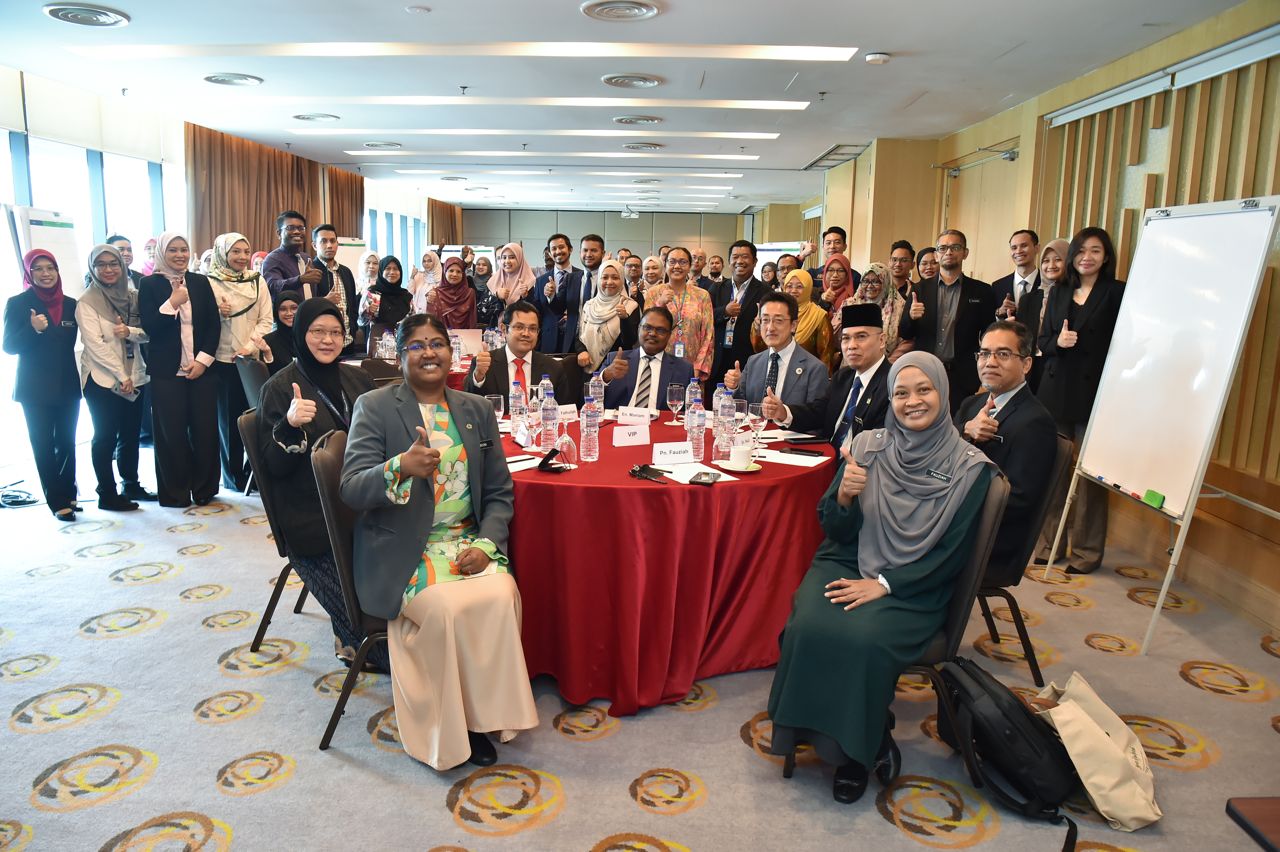
Reported by:
1) Mdm. Meena a/p Ramalingam
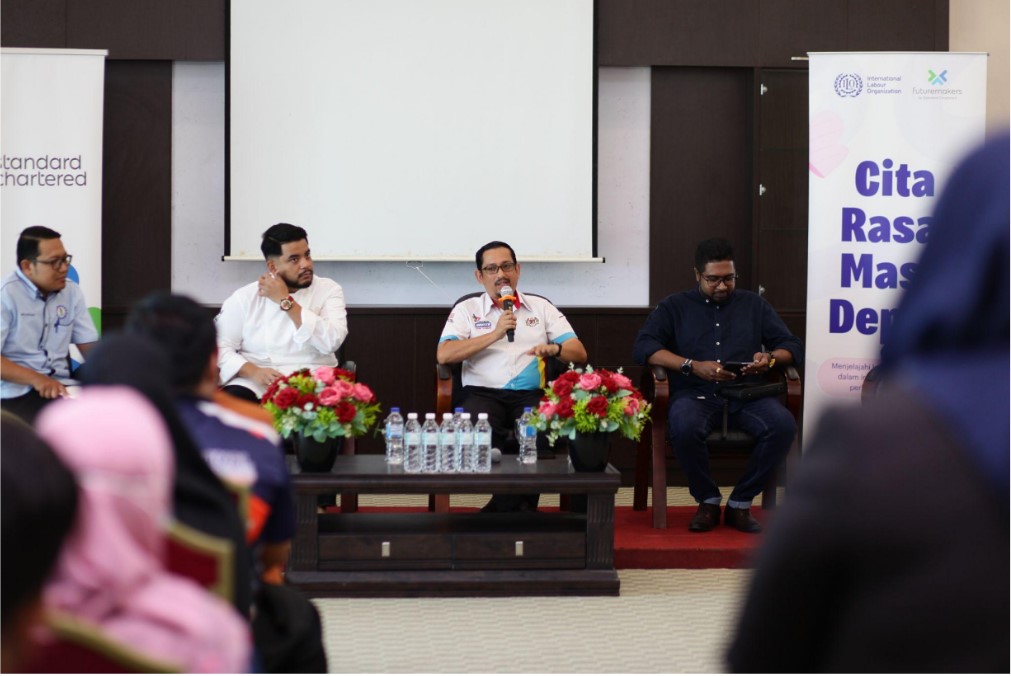
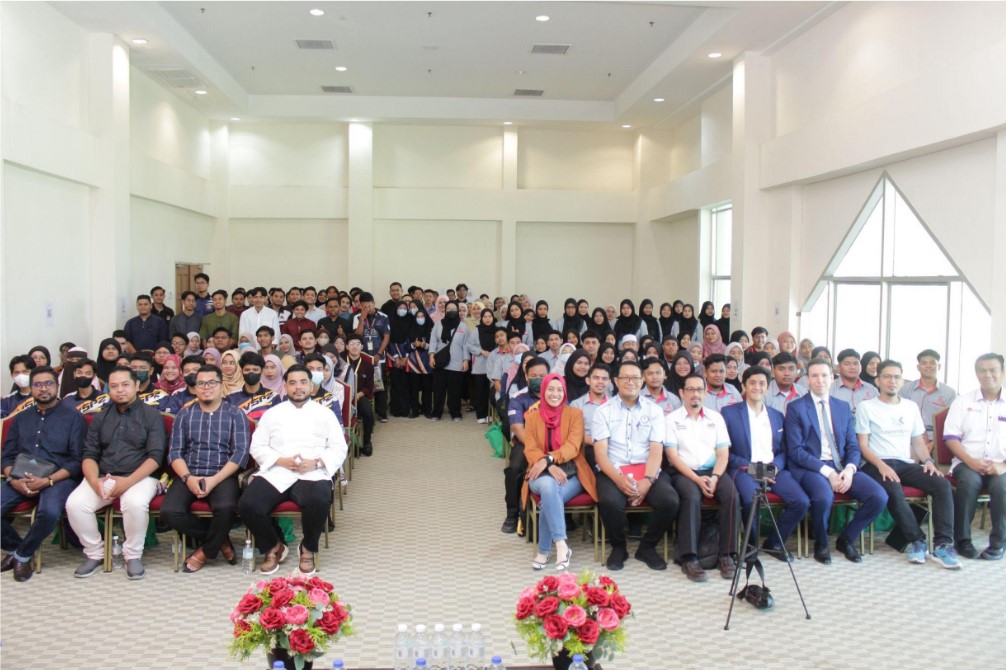
Young Futuremakers Malaysia by ILO is the project that aim to promote career progression of youth, particularly young women from vulnerable communities, through up/reskilling in demand-driven tech-oriented STEM and core skills, and supporting labour market transitions through career guidance and employment services.
On Saturday, 13 May 2023, the IILO and the Standard Chartered Foundation has organized the "Cita Rasa Masa Depan" program which aims to discover opportunities in Technical and Vocational Education and Training (TVET) for youth in Malaysia. This project is also part of the Young Futuremakers initiative organized by Standard Chartered, an effort globally to address the issue of inequality by promoting economic inclusion for vulnerable group.
The Skill Showcase and inspirational chat program program was held and attended by the ILO Youth Employment Expert, Mr. Felix Weidenkaff, he Masterchef Champion Season 1, Dr. Ezani Monoto, representative from the Malaysian Trade Union COngress (MTUC) and professional members from the food industry in Malaysia who is also a TVET graduates.
Reported by:
1) Mr. Mohd Azmir Bin Ahmad
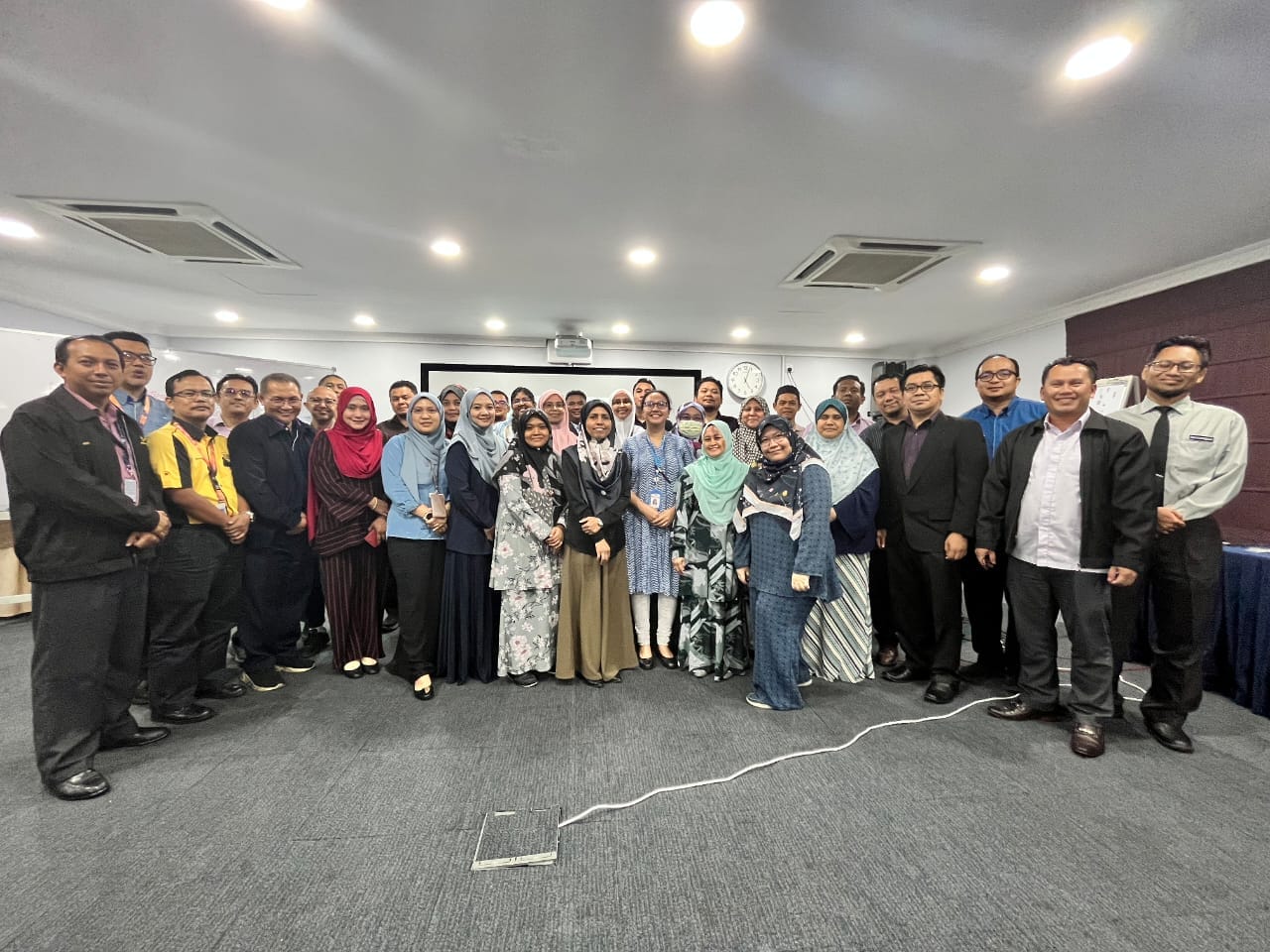
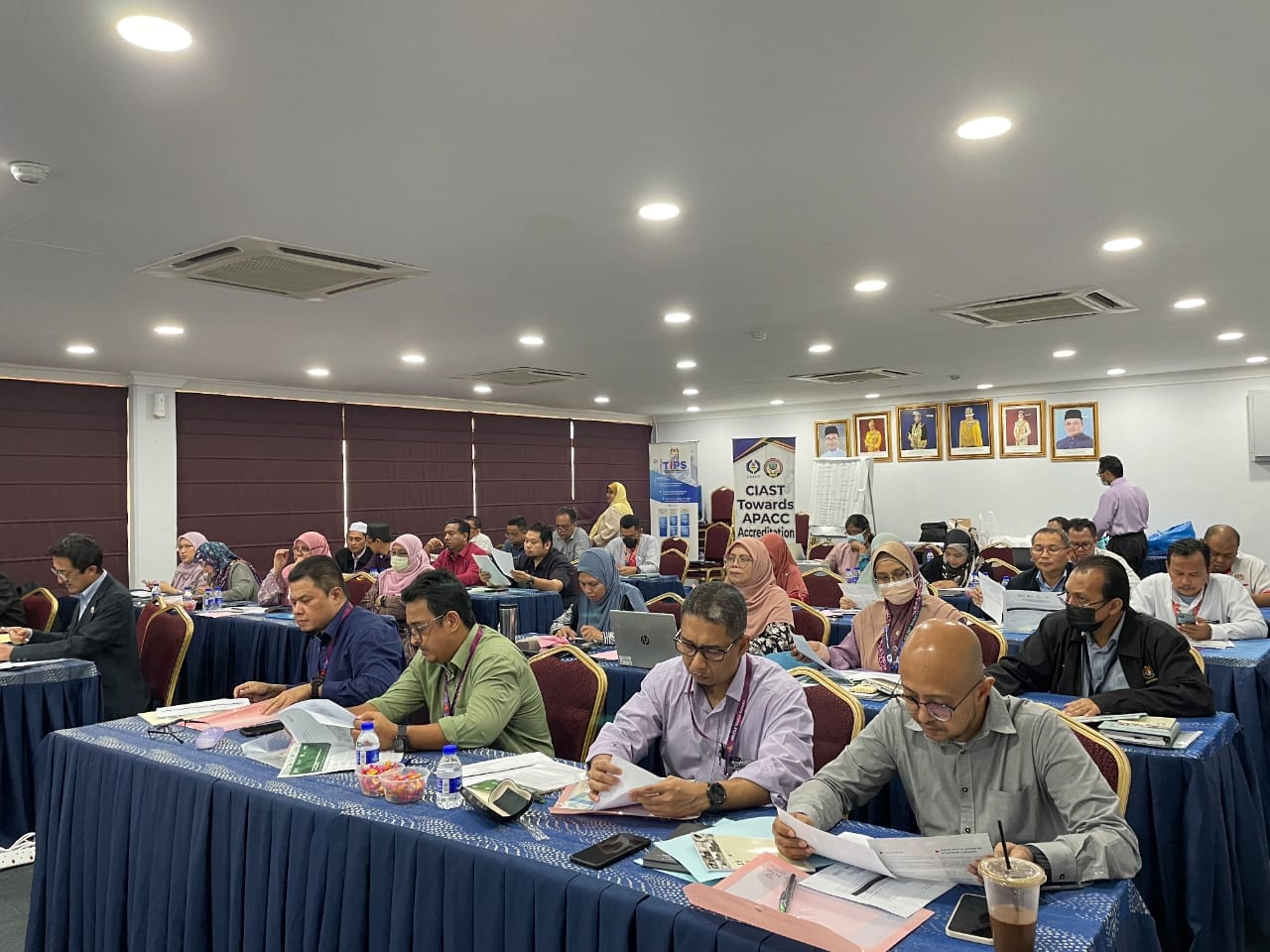
1) Ms. Norhidayah Binti Mohd Hanapiah
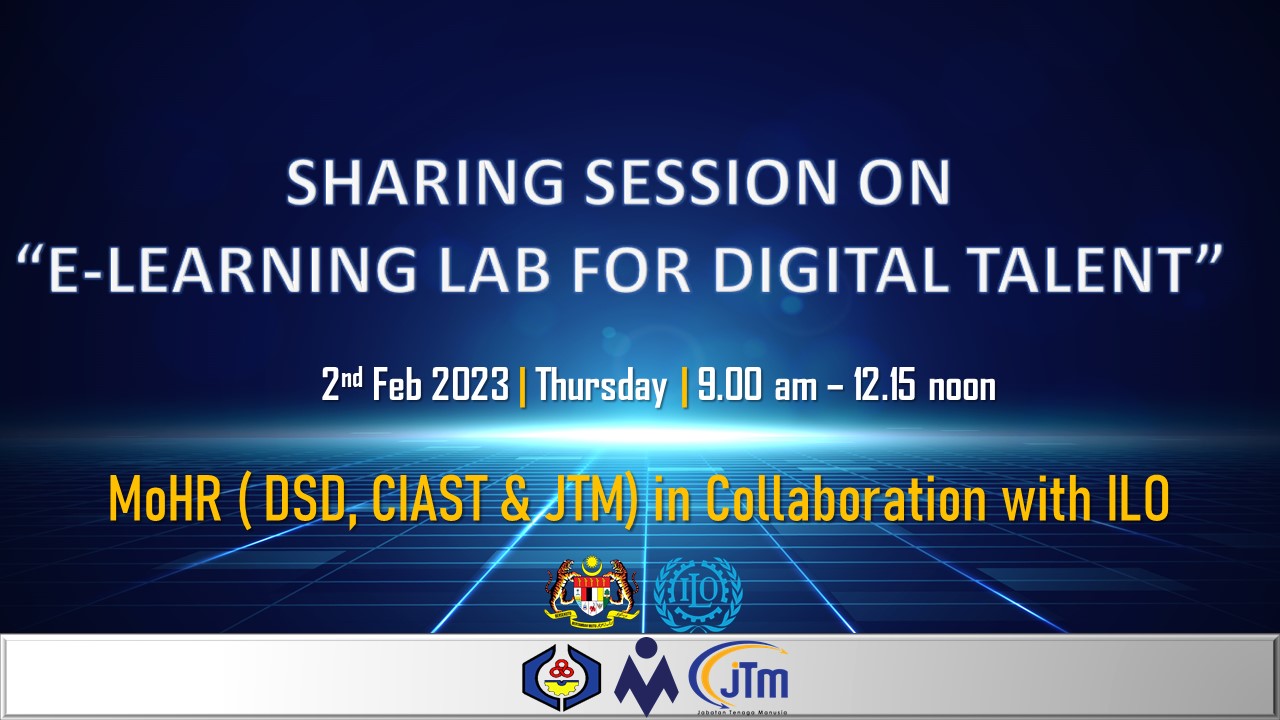
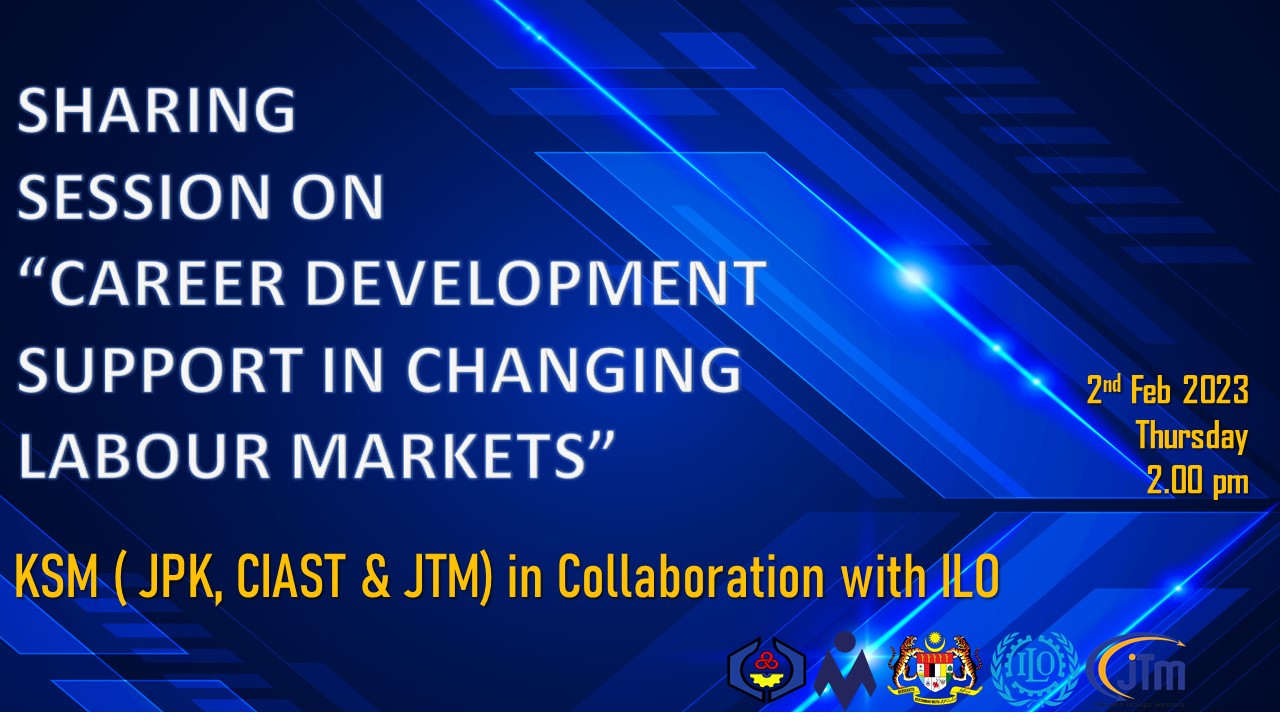
Skills for Prosperity (SfP) Malaysia, ILO International Training Centre (ITCILO)
Online Sharing Session :
"E-Learning Lab for Digital TVET and Career Development in Changing Labour Markets "
Date: 2nd February 2023
Medium: Online
Therefore, on 2nd February 2023, all 7 participants from DSD were delivered a sharing presentation regarding the information and knowledge especially for TVET Trainers gained from the online course that conclude as follows:
1. Learning how to develop efficient e-Learning platform (Hybrid / Blended Learning) which is interactive and able to attracts the interest of trainees by using the latest e-Learning applications.
2. Learning the Learning Management System (LMS) platform that can be used to manage online learning and assessment materials more structured (Moodle)
3. Learning Technologies (Tool-Box) such as Multimedia Tools that contains of (Authoring Tools, Presentation Tools, Collaborative Tools, And Screen Casting Tools).
4. Identify the best method to develop e-learning without marginalizing vulnerable groups to ensure that learning is delivered comprehensively.
Reported by:
1) Ms. Norhidayah Binti Mohd Hanapiah

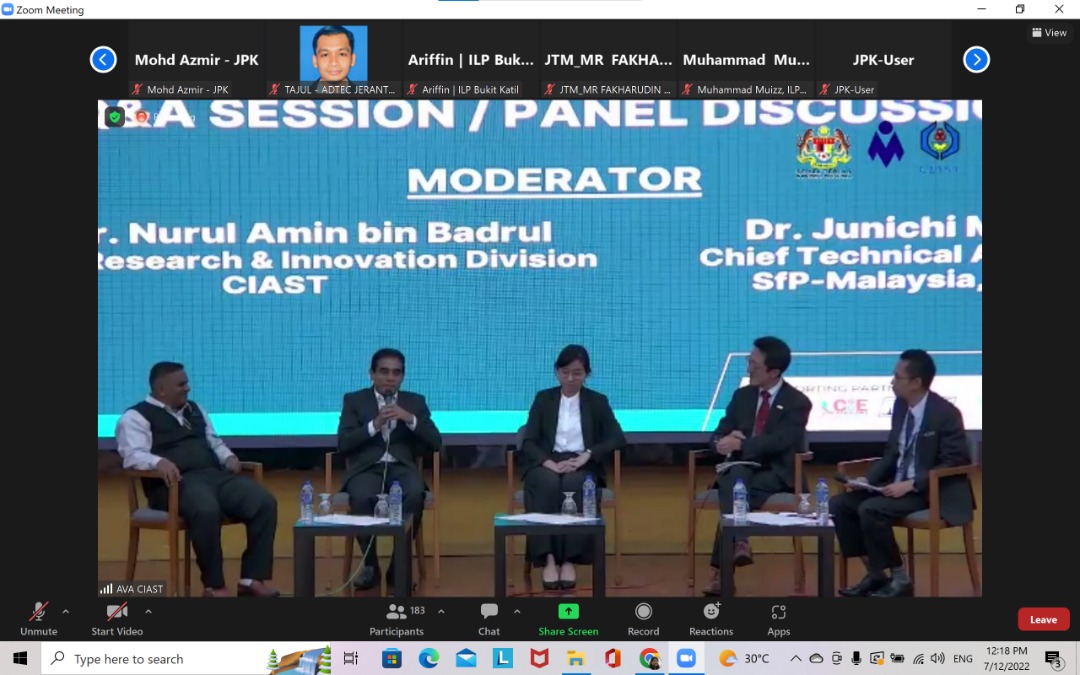
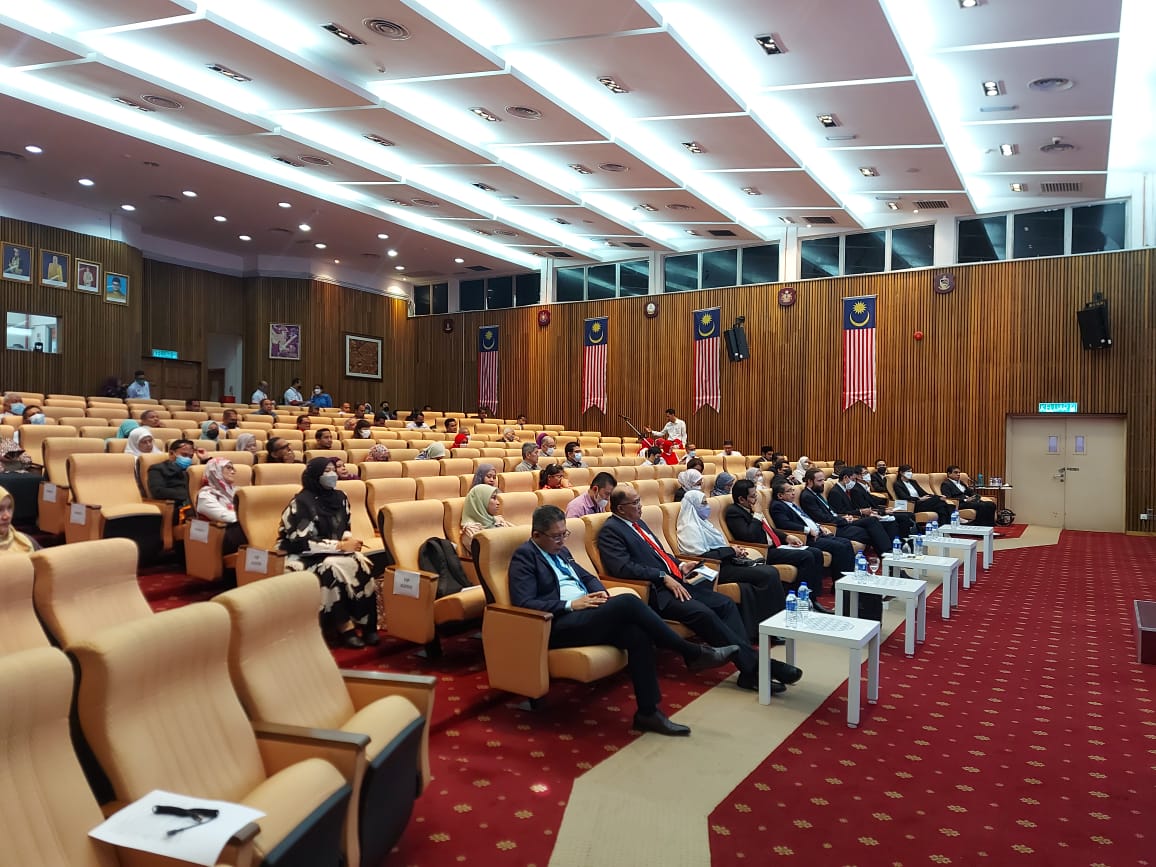
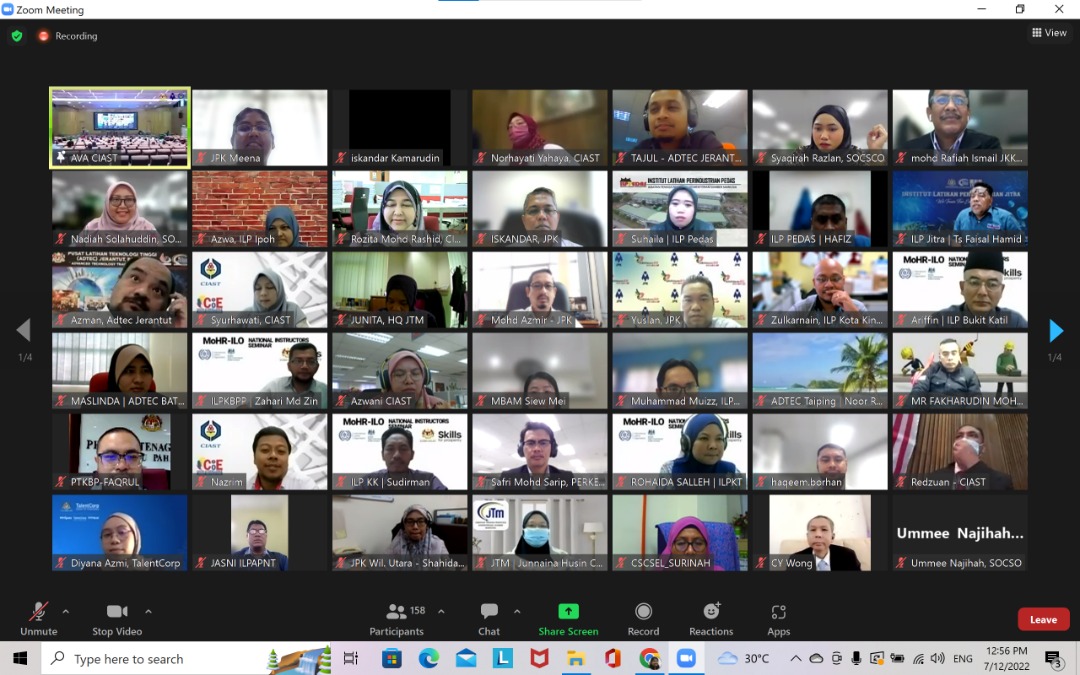
MoHR-ILO Knowledge Sharing:
“ILO Knowledge Sharing ~ SEMINAR ON DIGITAL TECHNOLOGY UTILISATION AND INDUSTRY SKILLS NEEDS AND THE SKILLS PROFILING WORKSHOP”
Date: December 7, 2022
Venue: Hybrid (CIAST - Online)
The seminar on the use of digital technology and industry skills requirements were delivered by 3 industry representatives in the construction, electronics and printing sectors.
Case 1: Digital technologies and skills needs in the construction sector, Ts. Lim Hui Yan, Gamuda Berhad / Alternate Council Member and Technical & IBS Committee Member of the Master Builders Association Malaysia (MBAM)
Case 2: Digital Skills in the Electric and Electronics Sector , Ts. Jonas Jeyaraj Anthony, Former Executive Director of Corporate Management, Panasonic Group Malaysia
Case 3: Digital Skills in the Industrial Printing Sector, Mr. Jayaraju Narayanasamy YAMAGATA MALAYSIA SDN. BHD.
The three invited panels from the industry shared the issues and challenges in facing the economic growth and development of the country in line with the progress of digital technology in their respective sectors.
The advantages transformation from conventional to digital technology utilization in industrial sector will be able to reduce dependence on foreign labor and increase employment opportunities for the country's skilled workforce to meet the needs of the industry towards a digitization system. Another benefits forecast through the adaptation of these digital skills is the reduction of costs due to human error because of the accuracy percentage of the automation system being close to 100%. This will be able to reduce the cost of material resources, reduce the time for the defect maintenance period and further increase the productivity and quality of the project produced.
Reported by:
1) Pn. Norhidayah Binti Mohd Hanapiah
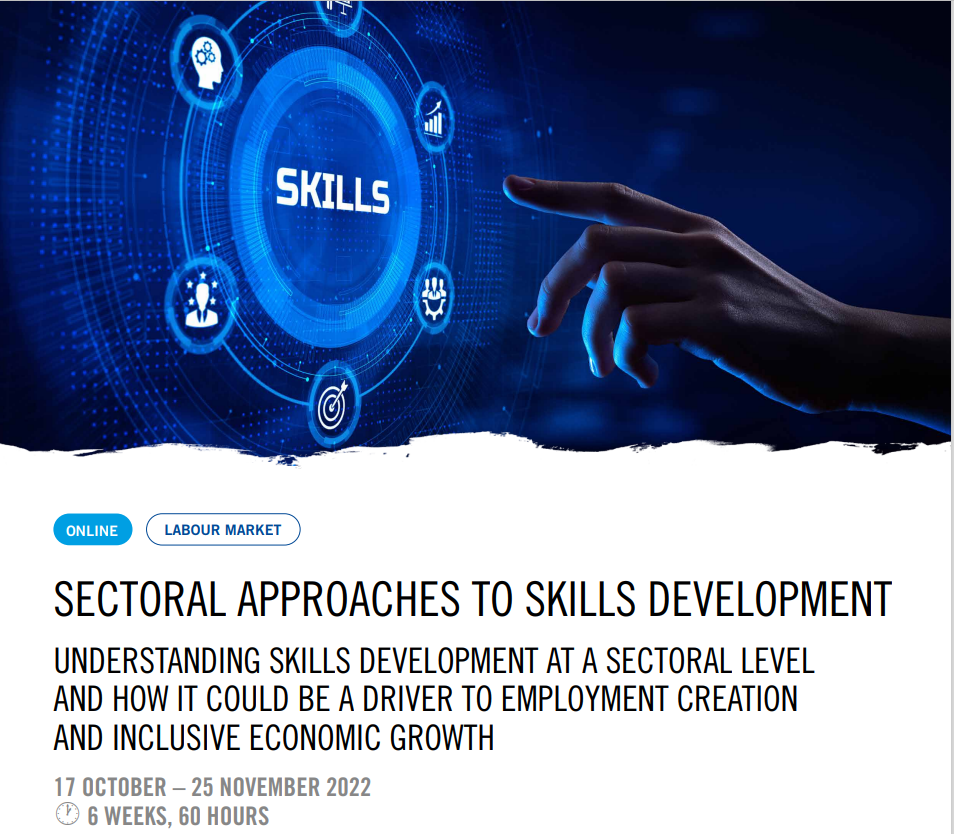
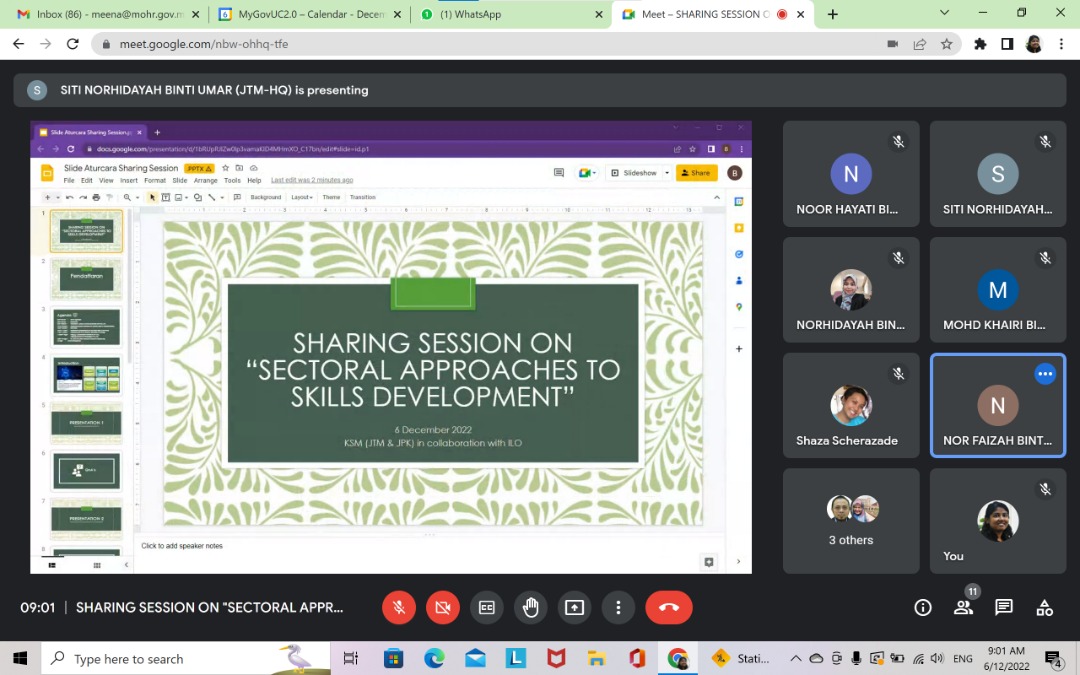
Skills for Prosperity (SfP) Malaysia, ILO International Training Centre (ITCILO)
Online Training Course :
"E-learning on Sectoral Approaches to Skills Development"
Date: 17th October - 25th November, 2022
Venue: Online, ITCLO
Attended by:
1) Mr. Nazrul Hilmi Bin Mohammad
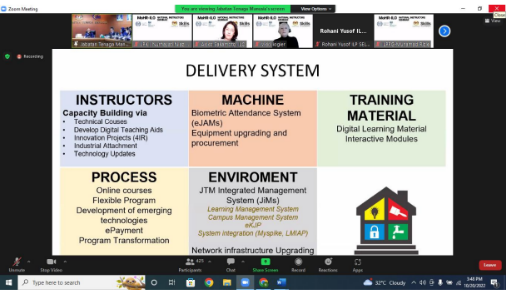
MoHR-ILO NATIONAL INSTRUCTORS SEMINAR:
National instructors Seminar :
“International Cases on Oigifa/ Competency Frameworks for Educators and
Citizens”
Date: October 20, 2022
Venue: Online
Reported by:
1) Pn. Nurhayati Binti Niaz Ahmad

e-TOWNHALL MEETING:
1st Malaysia Skills Challenge Innovation Call: Mainstreaming Gender Equality and Social Inclusion (GESI) in TVET/ Skills training institutions
Date: July 29, 2022
Venue: Online
Attended by:
1) Ts. Dr Mohamad bin Sulaiman
2) Ts. Kamaruzaman bin Hj. Md. Ali
3) Mr. Mohd Zuhdi bin Ibrahim @Ahyat
4) Mdm. Manira binti Mansor
5) Mdm. Meena a/p Ramalingam
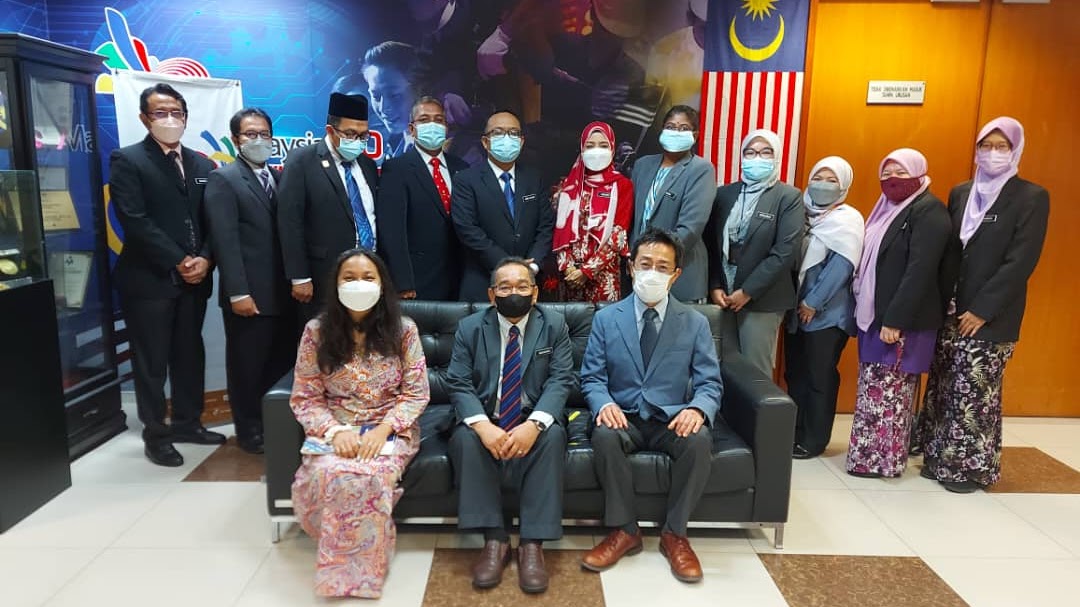
Courtesy Visit
Chief Technical Advisor, Skills for Prosperity Programme (SfP Malaysia) with Deputy Director General (Development), DSD
Date: June 24, 2022
Venue: DSD, Wawasan Meeting Room
The courtesy visit session between the Chief Technical Advisor, Skills for Prosperity Programme (SfP Malaysia), Dr. Junichi Mori from International Labor Organization (ILO) with Deputy Director General (Development), Ts. Dr. Mohamad Bin Sulaiman from DSD was held on 24 June 2022 with the attendance of 20 members consisting of the Director, Deputy Director, and Chief Assistant Director from DSD and 2 representatives from the MoHR. The fruitful session was conducted with an agenda arrangement that revolved regarding the current involvement from DSD withing ILO programs including:
1.Core committee member
-
Review of Institutional Mechanism for Industry Engagement in TVET/ Skill Training in Malaysia
-
Industrial Sectoral Situational Analysis Comprehensive Review Of Malaysia’s Lifelong Learning Policies And Programmes
-
TVET/SKILLS Network Online Meeting: The Skills for Prosperity Project in Kedah
-
SSTC-ILO-UK Partnership In Sabah Through “Skills For Prosperity Programme”
2. Co-host together
-
Seminar For Mainstreaming Gender Equality And Social Inclusion (GESI) in TVET/Skills Training in Malaysia – January 19, 2022
-
Seminar on Quality Apprenticeship: Concept and Implementation – October 20, 2021
3. Workshop on Skills for Trade and Economic Diversification (STED) for :
-
Food Processing Industry
-
Construction Industry
4. Steering Committee member The Skills for Prosperity Programme in Malaysia The MBAM-ILO-UK Partnership for Enhancement of A Sector Skills Body and Industry-Led TVET Modalities In The Construction Sector
5. And other programmes
Therefore, outcome of this courtesy visit enabled some understanding to be reached between both parties as well as opportunities for collaborate more for improvement and strengthening the skills agenda in the TVET sector in Malaysia through cooperation with countries and international organizations.
Reference:
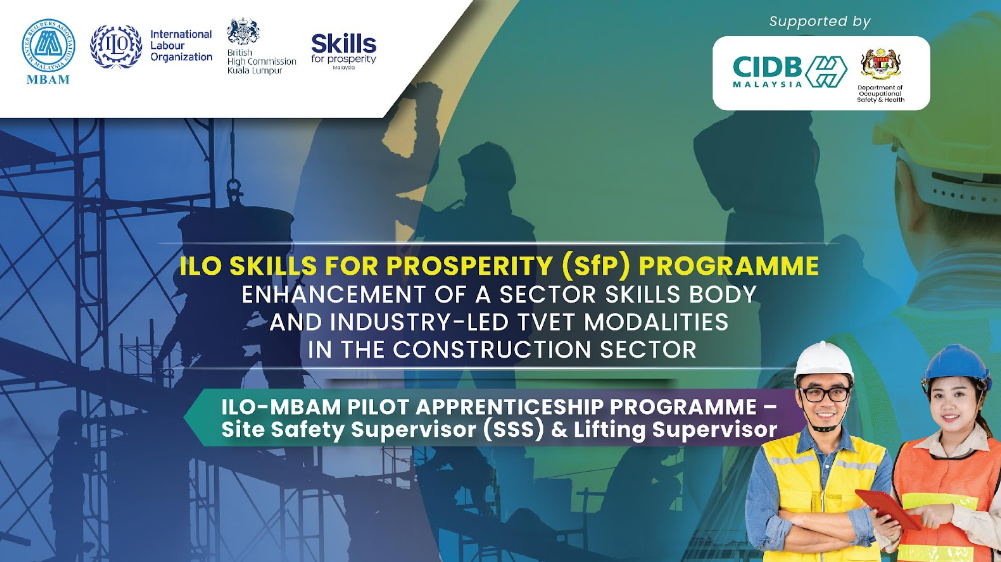
Steering Committee Meeting No. 1
The MBAM-ILO-UK Partnership for Enhancement of A Sector Skills Body and Industry-Led TVET Modalities In The Construction Sector
Date: May 19, 2022
Venue: Master Builders Association Malaysia Conference Room
Attended by : Mdm. Meena a/p Ramalingam
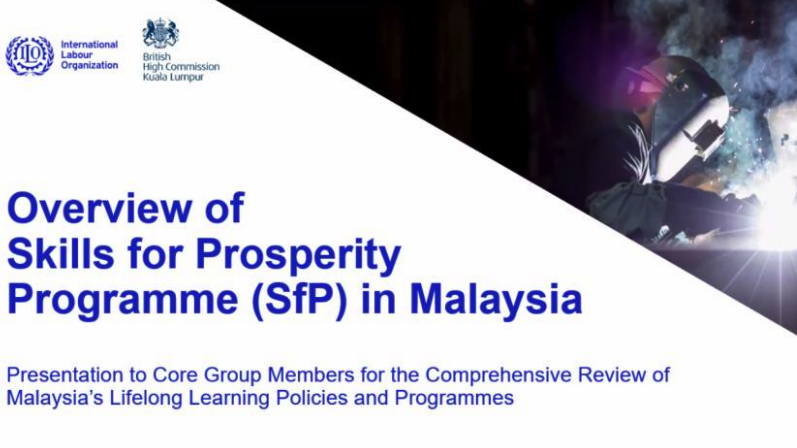
FIRST MEETING FOR THE PROJECT “COMPREHENSIVE REVIEW OF MALAYSIA’S LIFELONG LEARNING POLICIES AND PROGRAMMES” UNDER INTERNATIONAL LABOUR
ORGANIZATION (ILO)
Date: March 10, 2022
Venue: Video Conference
Under the Quality pillar, the Skills for Prosperity (SfP) Malaysia Project is conducting the comprehensive review of Malaysia’s lifelong learning policies and systems, aiming to deeply understand current lifelong learning system in Malaysia and identify gaps with the needs of workers and students, in particular those from or in TVET and skills training. The results of this analysis will be utilized to refine relevant activities of the Skills for Prosperity Program in Malaysia and other ILO’s initiatives. The SfP Malaysia forms the core group to ensure the quality of the report of this comprehensive review in terms of information, analysis, and recommendation. UTHM, to which the ILO commissioned this study, will deliver the following key outputs based on the work plan approved by the ILO.
Attended by : Mdm. Meena a/p Ramalingam & Mdm. Sharida bt Mohd Sharif
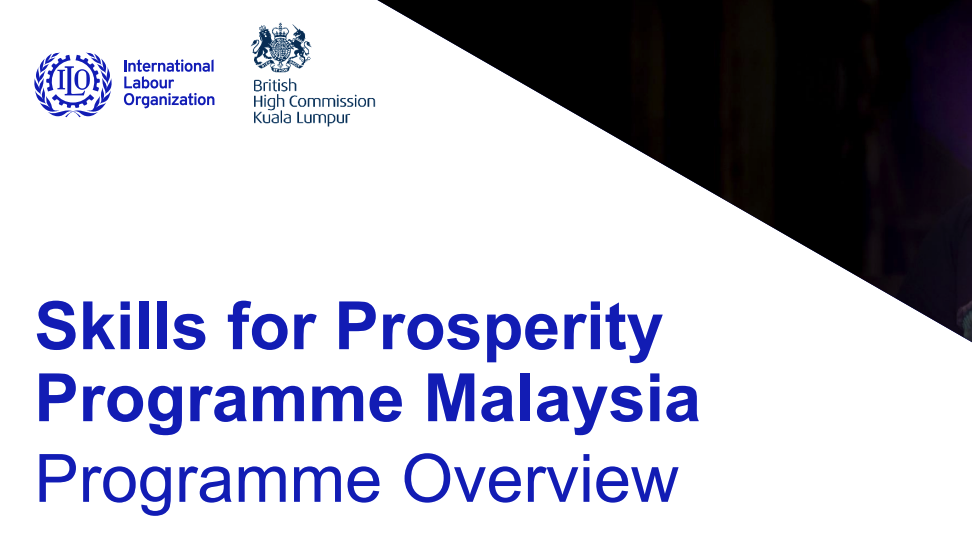
Seminar on “Review of Institutional Mechanism for Industry Engagement in TVET/ Skill Training in Malaysia: Presentation of Draft Final Report and International Cases"
Date: February 24, 2022
Venue: Video Conference
The International Labor Organization (ILO) has appointed the Malaysian Research & Education Foundation (MyREF) to develop the Review of Institutional Mechanism for Industry Engagement in TVET/Skills Training. The study focuses on the findings of existing collaborations between TVET/Skills training operators and industry players, the effectiveness of collaborations and recommendations to improve the effectiveness of such collaborations. The session was organized to present the draft final report of the study to the relevant stakeholders. The final study report will be distributed by ILO/MyREF later.
Attended by : Mr. Mohd Sarfudin Bin Awang
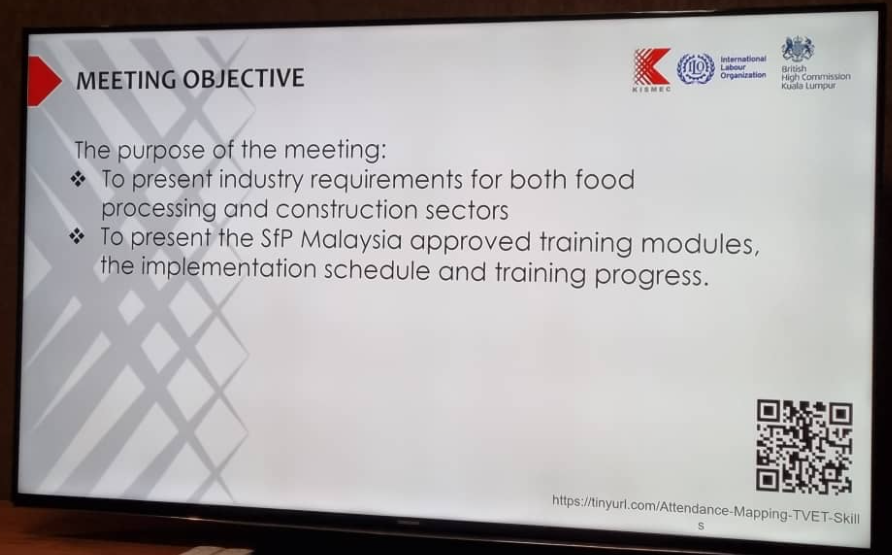
Seminar Skills for Prosperity Malaysia - TVET Network Progress Updates (Kedah)
Date: January 24, 2022
Venue: Video Conference
The meeting discussed the latest progress on the S4P project that is being carried out by the training provider, KISMEC Kedah, in the fields offered for this program, namely Food Processing and Construction Industry. The meeting was informed that a total of 60 program participants involved 30 apprentices for each program. Implementation began for the first cohort and is expected to end at the end of Feb 2022. Selection for the second cohort is in the process of selecting participants and will be implemented in March 2022. The meeting also discussed issues and improvements for the first cohort and reports need to be submitted to the ILO and British High Commission.
Attended by : Mr. Mohd Azmir bin Ahmad
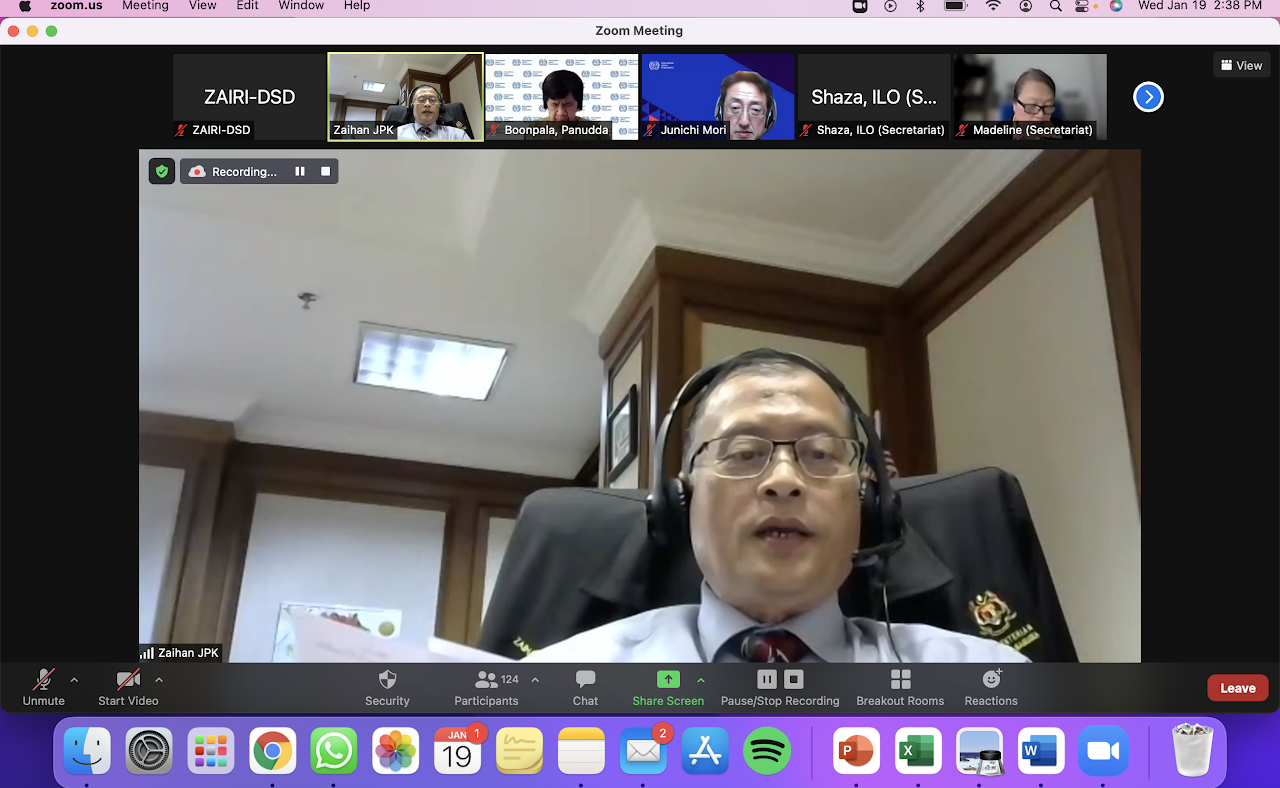
Seminar For Mainstreaming Gender Equality And Social Inclusion (GESI) in TVET/Skills Training in Malaysia (Co- Host)
Date: January 19, 2022
Venue: Video Conference
In this seminar, participants learned about key concepts on mainstream GESI funding in TVET/skills systems derived from the ILO's "Guide to making TVET and skills development inclusive" as well as examples of international solutions for mainstream GESI. They will also understand the mainstream status of GESI in the Malaysian TVET/skills system and its challenges. GESI will be announced as the next project activity to promote the mainstream of GESI in TVET/skills training institutions.
Attended by :
1) Dato' Ts. Zaihan bin Shukri (Opening Speech)
2) Mdm. Faizah binti Harun
3) Mr. Ahmad Iskandar bin Sulaiman
4) Mdm. Molinda Binti Abd Rahman
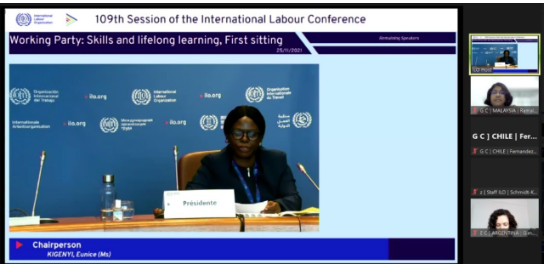
109th Session of the International Labour Conference Second segment
Date: November 26 - December 24, 2021
Venue: Video Conference
This Working Party was established by the Conference to deal with the general discussion on Skills and lifelong learning during the resumed part of the 109th Session. It will carry out its work, through virtual means, from Thursday 25 November to Friday 11 December 2021, in accordance with the Special arrangements and rules of procedure for the 109th Session (ILC.109/D.1 ). The general discussion will be based on the report and suggested points for discussion.
Attended by : Mdm. Meena a/p Ramalingam
Reference:
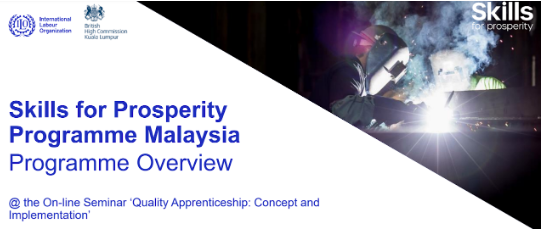
Workshop on Skills for Trade and Economic Diversification (STED) for Food Processing Industry
Date: November 22 - 24, 2021
Venue: Video Conference
This workshop aims to develop the draft sector skills strategy, which consist of future growth drivers, current and future skills needs and challenges, and recommendations for priority actions on skills initiatives. The visioning exercise, the main elements of this workshop, will be conducted by utilising ILO’s STED methodology, which has been applied in many other countries, and outputs from the previous sessions and the industrial sectoral analysis to the fullest. The skills strategy, as the common vison among government, industry, and social partners, will contribute to increasing the supply of skilled workers and their readiness to meet future sectoral skills demand. Furthermore, the structured visioning exercise will provide an opportunity to enhance collaboration among key stakeholders in skills development and
deepen understanding of the industry skill demands in a forward-looking way. Finally, the outputs of this workshop will be the basis of upcoming pilot activities, which aim to promote industry leadership in TVET/skills training. The SfP Malaysia will design and organise the pilot activities, in close cooperation with national partners invited to this workshop.
Attended by :
1) Mr. Rohaizat bin Ramli
2) Mr. Nazrul Hilmi bin Mohammad
3) Mdm. Noryati binti Md Yasin
4) Mr. Mohamad Faisal bin Abdullah
Reference:

Pre-Workshop Briefing on STED for Food Processing Sector
Date: November 17, 2021
Venue: Video Conference
This pre-workshop meeting on 17 th November aims to collect in-depth information on the needs for skilled workers required for the further growth of Malaysia’s food-processing, which supplements the findings of the industrial sectoral analysis report. The outputs of the workshop will increase the efficiency and effectiveness of the STED workshop planned on 22-24 November, which aims to develop an enhanced sector skills strategy for the food-processing industry in Malaysia. This strategy will contribute to increasing the supply of skilled workers who meet current and future sectoral demand. Furthermore, it will form the basis of upcoming pilot activities organised by the SfP Malaysia. The Skills for Prosperity in SouthEast Asia Programme (SfP-SEA) aims to contribute to increasing national capacity to achieve sustained and inclusive growth through the enhancement of skills development and technical and vocational education and training (TVET) systems in Malaysia, Indonesia, and the Philippines. In Malaysia, the Programme (the SfP Malaysia) will facilitate national partners to enhance a sector skills strategy for the Malaysian food processing sector under the “Relevance” pillar (see Annex 2 for the project overview). The strategy will be developed in close cooperation among key stakeholders from government, industry, workers’ organisations, TVET/skills training institutions, and other social partners.
Attended by :
1) Mdm. Meena a/p Ramalingam
2) Mr. Rohaizat bin Ramli
3) Mr. Nazrul Hilmi bin Mohammad
4) Mdm. Noryati binti Md Yasin
Reference:

Seminar on Quality Apprenticeship: Concept and Implementation (Co-Host)
Date: October 20, 2021
Venue: Video Conference
The Chief Technical Advisor, SfP Malaysia spoke on the challenges to Malaysian Skills and the TVET System including the pillars of equity, quality, relevance and cost effectiveness. Quality apprenticeship seminars were held to discuss the issues relevance under the SfP project to facilitate the transition to industry -led skills demand and supply coordination. This seminar aims to improve Malaysia’s national capacity for inclusive growth. The main recipients of the program in Malaysia are targeted at women and youth in the construction and food processing industries.To develop a replicable, scalable and sustainable model of local quality apprenticeship programs, SfP adopts a multi -party approach, involving partners national, social and industrial partnerships.
Attended by :
1) Dato' Ts. Zaihan bin Sukri (Opening Speech)
2) Ts. Syarumiefizal bin Baharum
3) Ts. Mohmad Zairi Bin Ramly
4) Mdm. Nasriah Binti Johadi
5) Mr. Rohaizat Bin Ramli
6) Mdm. Nor Aishah Bt Mohd Tahir
7) Ts. Mohd. Azmi bin Pelah
8) Mr. Mohd Azmir Bin Ahmad
9) Mr. Zaidi Bin Md. Yusuf
Reference:
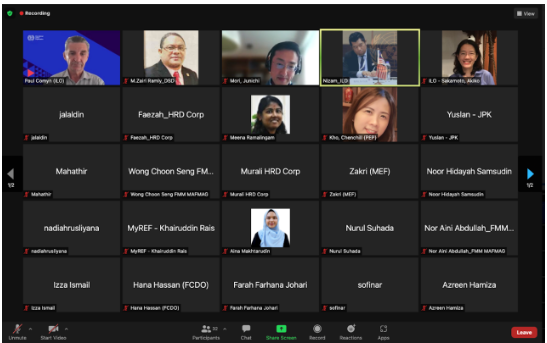
Seminar on the Draft Final Report of the Review of Institutional Mechanism for Industry Engagement in TVET Report by MyREF
Date: September 30, 2021
Venue: Video Conference
Presentation of the final draft of the Review of Institutional Mechanism for Industry Engagement in TVET Report by MyREF- Based on Increasing national capacity for inclusive economic growth through more future-ready and equitable skills and TVET systems
Attended by :
1) Mdm. Meena a/p Ramalingam
2) Ts. Syarumiefizal bin Bharun
3) Ts. Mohmad Zairi bin Ramly
4) Mr. Yuslan bin Yasok
5) Mr. Ahmad Fadhil bin Ismail
Reference:
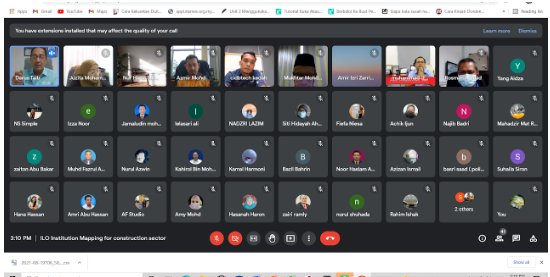
Institutional Mapping Meeting in The TVET/SKILLS Training Related to Constructions Industry in Kedah
Date: August 19, 2021
Venue: Video Conference
Mesyuarat ini melibatkan institusi latihan kemahiran/ TVET,badan persijilan, agensi kerajaan pusat dan kerajaan negeri dalam memberikan input dan panduan untuk menjayakanprogram ini an dipantau serta dibantu oleh ILO dan British High Commission.
Attended by : Mr. Mohd Azmir bin Ahmad
Reference:
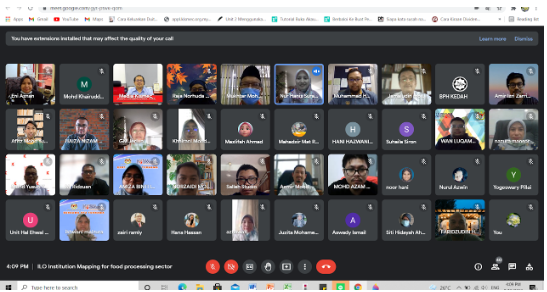
Institutional Mapping Meeting in The TVET/SKILLS Training Related to Food Processing Industry in Kedah
Date: August 18, 2021
Venue: Video Conference
Mesyuarat ini melibatkan institusi latihan kemahiran/ TVET,badan persijilan, agensi kerajaan pusat dan kerajaan negeri dalam memberikan input dan panduan untuk menjayakanprogram ini an dipantau serta dibantu oleh ILO dan British High Commission.
Attended by : Mr. Mohd Azmir bin Ahmad
Reference:

Institutional Mapping Meeting in The TVET/SKILLS Training Related to Food Processing Industry in Kedah
Date: August 18, 2021
Venue: Video Conference
Mesyuarat ini melibatkan institusi latihan kemahiran/ TVET,badan persijilan, agensi kerajaan pusat dan kerajaan negeri dalam memberikan input dan panduan untuk menjayakanprogram ini an dipantau serta dibantu oleh ILO dan British High Commission.
Attended by : Mr. Mohd Azmir bin Ahmad
Reference:
BACKGROUND:
Aiming for high-income status by 2030, Malaysia is boosting productivity and competitiveness. The development of a high-skilled workforce and the promotion of diversity in the workplace are key to this endeavour. The government has identified technical and vocational education and training (TVET) as a ‘game changer’ for achieving inclusive growth. It, thus, has implemented several TVET reform policies. However, there are many remaining challenges in foreseeing future skills demand, harmonising the TVET governance systems, promoting equity and inclusion, and enhancing industry engagement. The Skills for Prosperity Programme in Malaysia (SfP-Malaysia) works with government, employers’ and workers’ organisations, and other local and international stakeholders to address these challenges and make the Malaysian workforce resilient and adaptable to the changing world of work.
Duration: November 2019 - March 2023
Donor: The United Kingdom Government
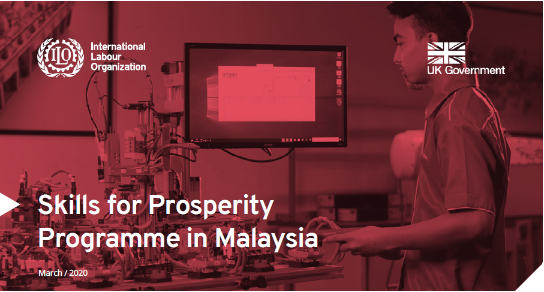

Core Group Discussion of Review of Institutional Mechanism for Industry Engagement in TVET/skills Training - Online Seminar on The Interim Findings - Construction & Food Processing
Date: July 30, 2021
Venue: Video Conference
The Skills for Prosperity Southeast Asia Programme - Malaysia (SfP Malaysia),funded by the UK Government, aims to improve Malaysia’s capacity to achievesustainable and inclusive growth through the enhancement of skills development and technical and vocational education and training (TVET) systems.
Attended by :
1) Mr. Mohd Sarfudin bin Awang
2) Ts. Syarumiefizal bin Baharum
3) Mr. Ahmad Fadhil bin Ismail
Reference:
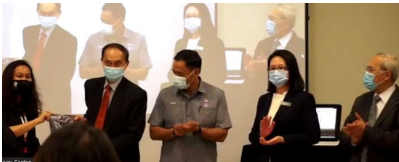
Update On Skills For Prosperity Project in Sabah (SFP) - A Joint Collaboration Between International Labour Organization (ILO), Sabah Skills & Technology Centre and British High Commision Kuala Lumpur
Date: July 29, 2021
Venue: Video Conference
The Skills for Prosperity Project Malaysia is a project that aims to increase capacity in Malaysia in inclusive economic growth through skills and TVET by using a targeted sector approach and gender equality and social inclusion (GESI). Jesteru, TVET and skills development are applied to improve employment, employment opportunities and potential of the target group. In addition, this collaboration aims to expand future inclusiveness and readiness among target groups in Sabah. The project also aims to build.
Attended by : Ts. Mohd. Azmi bin Pelah
Reference:
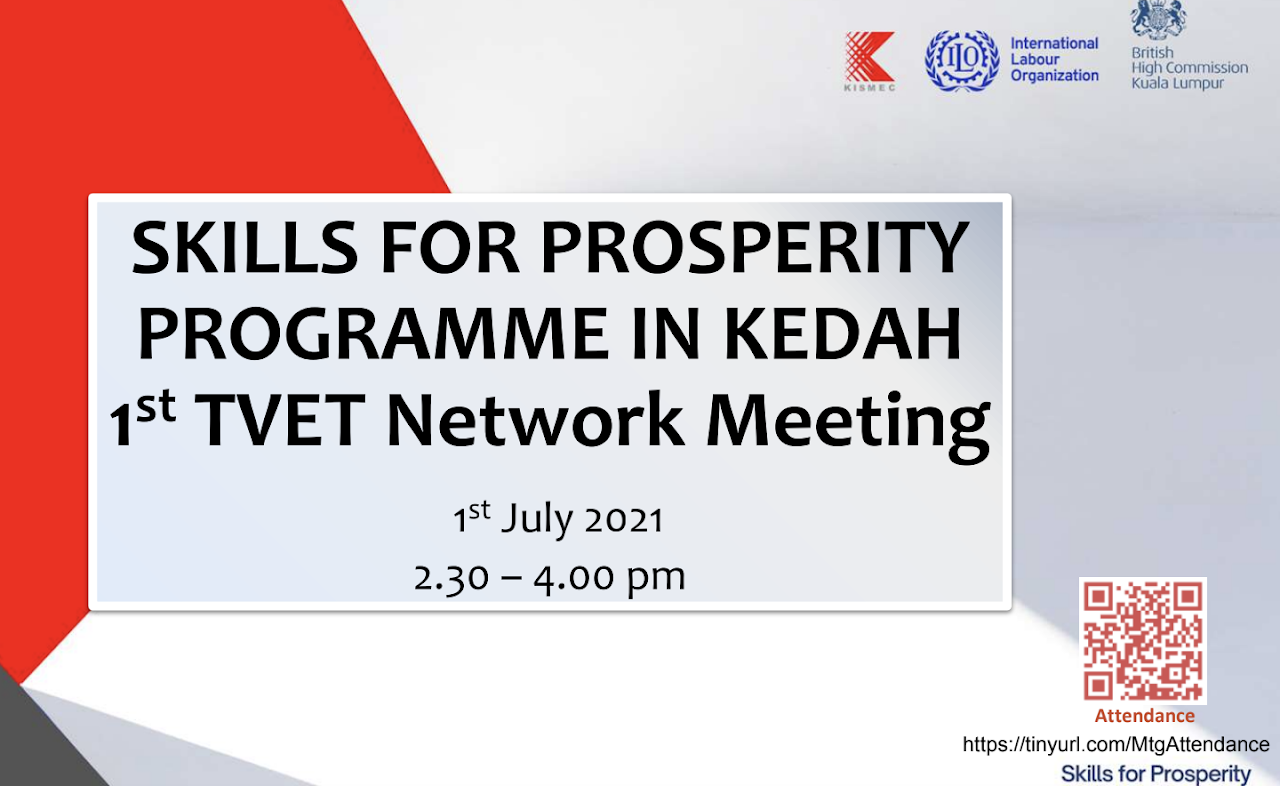
The 1st TVET/SKILLS Network Online Meeting: The Skills for Prosperity Project in Kedah
Date: July 1, 2021
Venue: Video Conference
The purpose of this meeting was to present on the introduction of the “Skills For Prosperity Program in Kedah in collaboration with the ILO and the British High Commission. This program starts from Nov 2019 to March 2023. The introduction to this program was presented by Dr. Junichi Mori of the International Labor Organization (ILO). The meeting also presented information on the Kedah TVET Network that will be implemented. Presentation about the Term of Reference (TOR) of the Kedah TVET Network Committee presented by En. Kamal Harmoni from KISMEC. A description of the objectives of this program is to target employment opportunities, skills utilization and gender equality. The target group of this program will involve women, youth, Kedah people category B40, employees existing and job seekers.
Attended by : Mr. Mohd Azmir bin Ahmad
Reference:
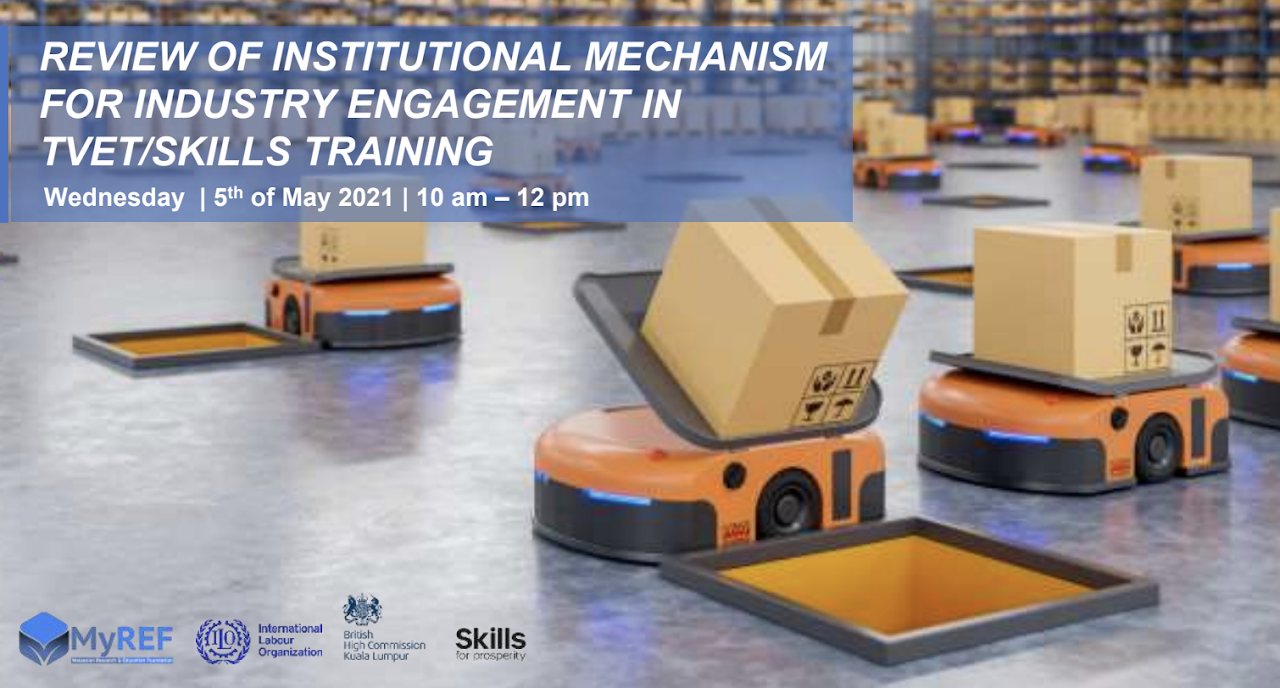
Meeting with Director General, Department of Skills Development - Institutional Mechanism for Industry Engagement in TVET/Skills Training
Date: May 27, 2021
Venue: Video Conference
The purpose of this meeting is for the ILO and MyREF to obtain relevant information for developing the report for Institutional Mechanism for Industry Engagement in TVET/Skills Training. DSD provided the inputs required by MyREF in the development of this report. Several divisions were involved to provide the related input. In addition MyREF has previously obtained approval for involvement of 2 officers from DSD Dr. Zool Hilmi Bin Mohamed Ashari, NOSS section, JPK and Ts. Dr Nurul Amin bin Badrul, CIAST, JPK in their team.
Attended by : Directors and Officer Planning, Development & Research Division
Reference:

Regional Webinar - Skills for Prosperity in South-East Asia programme
Date: May 25, 2021
Venue: Video Conference
This regional webinar aims to introduce anticipation of future skills needs becomes a priority area to reduce skills mismatches in the labour market and develop effective and demand-oriented skills and TVET systems. The concept of skills needs assessment and anticipation includes a number of key elements, including: (a) governance of labour market information and skills anticipation processes; (b) methods and tools for data collection, compilation and analysis; and (c) institutional frameworks, arrangements and social dialogue mechanisms.
Topic of discussion :
• How can skills anticipation activities support review and development of national skills and TVET system policies and strategies?
• How can labour market information and intelligence be effectively coordinated in a systematic manner?
• What are the benefits and lessons learned of using sectoral skills needs anticipation approaches?
• What are the institutional responsibilities, structures and coordination arrangements for effective skills anticipation?
• What is the relevance of social dialogue mechanisms in building consensus in relation to skills anticipation and matching?
• What changes, if any, and challenges are faced by current skills anticipation and matching systems as we experience and transition away from the COVID-19 crisis?
Attended by :
1) Mdm. Meena Ramalingam
2) Ts. Syarumiefizal bin Baharum
3) Ts. Mohmad Zairi bin Ramly
4) Mr. Ahmad Fadhil bin Ismail
Reference:
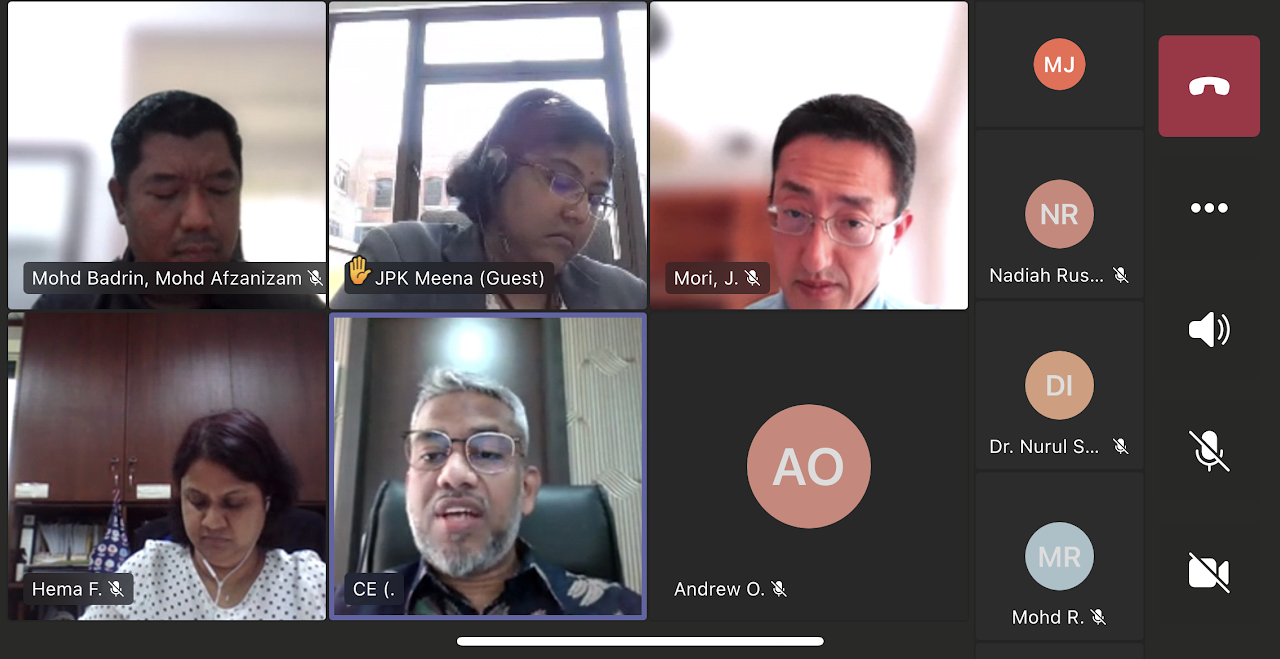
Core Group Meeting for the review of Institutional Mechanisms for Industry Engagement in TVET / Skills Training
Date: May 5, 2021
Venue: Video Conference
MyREF has obtained approval for involvement of 2 officers from DSD Dr. Zool Hilmi Bin Mohamed Ashari, Bahagian NOSS, JPK and Ts. Dr Nurul Amin bin Badrul, CIAST, JPK in their team. The purpose of this meeting is to obtain information of developing interim report presenting by Malaysian Research & Education Foundation (MyREF). Workplan : March-June 2021
The process includes:
1) Review of previous and existing institutions
2) Development of steering committees
3) Capacity building for steering committees and secretariat from other counties
4) Enhanced mechanisms start operating
Attended by :
1) Mdm. Meena Ramalingam
2) Dr. Zool Hilmi Bin Mohamed Ashari
3) Ts. Dr Nurul Amin bin Badrul
4) Ts. Mohmad Zairi bin Ramly
Reference:
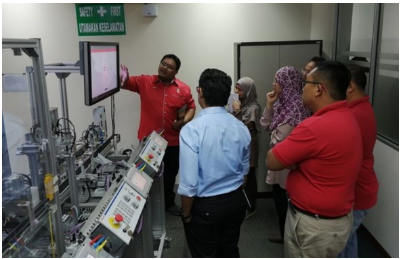
Meeting With The Representative Of Government Agencies For Sstc-ilo-uk Partnership In Sabah Through “Skills For Prosperity Programme”
Date: May 4, 2021
Venue: Video Conference
The "Skills for Prosperity" program is conducted in collaboration between the ILO and the SSTC to run a program to help indigenous communities (target groups) in the state Sabah affected due to Covid19 pandemic involving “Home Grown Industries” in the food sector (process, manufacturing, distribution)
Attended by : Ts. Mohd. Azmi bin Pelah
Reference:
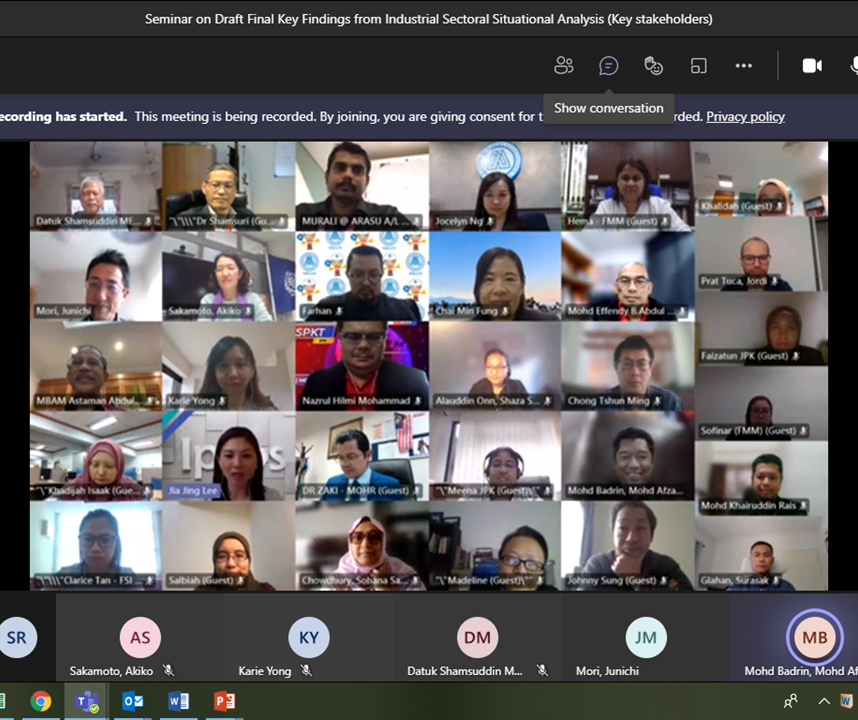
Webinar/ Seminar on Presentation of the Draft Final Report on Industrial Sectoral Situational Analysis
Date: April 13, 2021
Venue: Video Conference
This seminar is the final presentation of the research information that was presented on 13 April 2021 as the information below. This presentation was held for Sectoral overview of the food processing and construction sectors at the national level and sub-national level, Sabah and Kedah.
Objectives:
a) Understand current business environment, business performance (e.g. at least in last 5 years) and growth prospects/potential of the selected sectors, based on several growth scenarios, including mechanization, digitalization and other technology adoption as well as green transformation in next 5 years.
b) Understand the overview of structure of the respective sectors, in terms of composition of sub-sectors, the number of enterprises, supply chains, employment and occupational categories, including mapping of occupations/jobs and corresponding qualifications/certifications.
c) Understand the overview of skills demand and mismatch in the selected sectors and sub-sectors.
d) Obtain inputs to fine-tune the implementation plan in particular for activities under the Relevance Outcome of the project
Attended by :
1) Dr. Saidi bin Zain
2) Mdm. Meena Ramalingam
3) Ts. Mohmad Zairi bin Ramly
4) Mdm. Faizatun binti Zohedi
5) Mdm. Khadijah Binti Isaak
6) Mdm. Noor Azura binti Adnan
Reference:
> Report Skills Demand And Mismatch In Food Processing And Construction Sectors

Seminar on Draft Final Key Findings from Industrial Sectoral Situational Analysis (Core Group)
Date: April 1, 2021
Venue: Video Conference
This seminar was held for a Sectoral overview of the food processing and construction sectors at the national level and sub-national level, Sabah and Kedah.
1) Its Objectives to understand the current business environment, business performance and growth prospects/potential of the selected sectors, based on several growth scenarios, including mechanization, digitalization and other technology adoption as well as green transformation in the next 5 years.
2) Understand the overview of structure of the respective sectors, in terms of composition of sub-sectors, the number of enterprises, supply chains, employment and occupational categories, including mapping of occupations/jobs and corresponding qualifications/certifications.
ILO and Ipsos S3 have engaged with more than 20 organizations from industry players and industry representatives at national level and at target states as well as TVET providers. Feedbacks and comments were collected from relevant key stakeholders from an interim workshop attended by 47 stakeholders for improvement of key findings and information validation. Many industry players have pointed out that current education system is only producing graduates with general knowledge while companies need niche skills catered for the specific functions to the company; this leads us to the three identified issues which are thought to be impeding the skills development:
a) Lack Of Specialized Courses
b) No Specific Academic Requirement
c) Lack Of Collective Proactive Approach
Attended by : Ts. Mohmad Zairi bin Ramly
Reference:
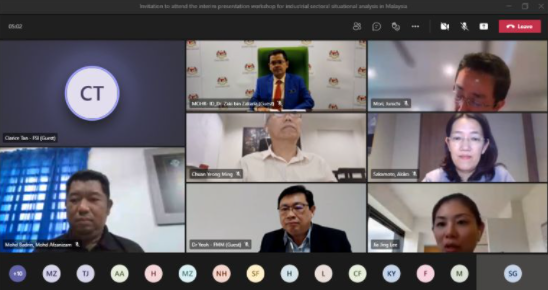
Webinar on Interim Presentation Workshop For Industrial Sectoral Situational Analysis In Malaysia
Date: March 2, 2021
Venue: Video Conference
The International Labor Organization (ILO) under the Skills for Prosperity Southeast Asia Program - Malaysia (S4P) project has appointed Ipsos Strategy3 as a consultant to conduct industry studies based on sectors that focus on two (2) sectors, namely the manufacturing and construction sectors. The results of this study will be used as a basis in planning strategies and activities to implement this S4P project. This programme aims to Increasing national capacity for inclusive economic growth through more future-ready and equitable skill and TVET systems.
Key findings from stakeholders IDI for Food Processing:
Many SMEs are still utilizing traditional machineries whereas MNCs are utilizing more advances machineries which requires the employment of an expat skilled worker. This food processing industry requires a more hands-on approach and training for TVET graduates and local semi-skilled workforce.
Key findings from stakeholders IDI for Construction:
Greater technology adoption needed to reduce dependency on foreign workers and enhance reputation of jobs of the construction sector. This in because limited by business uncertainties.
Key findings from stakeholders IDI of TVET Providers:
The TVET empowerment agenda is co-led by MOHE and MOHR, supported by collaboration across ministries and industry involment. Final Outline of strategic advice and inputs on the project strategies:
1. The Project’s sectoral approach to skills development
2. Potential implementation partners for activities under the Relevance
Pillar.
3. Potential champion enterprises for the project activities.
4. Baseline indicators.
5. Potential risks for project activities.
Attended by : Ts. Mohmad Zairi bin Ramly
Reference:
15 June - 30 August 2020 [Online]: E-Learning Course On - Skills For Social Inclusion
8 May - 17 July 2020 [Online]: E-Learning Course On - Management Of Vocational Training Centres
12-13 September 2019, HANOI VIETNAM
SKILLS IN ASEAN
The 5th Regional Skills Technical Working Group Meeting Enhancing Human Resources Development in ASEAN: Progress of MRAs and MRS
The Regional Skills Technical Working Group was established in 2014, functioning primarily as a technical level working group that supports all skills-related activities of the ILO including the mutual recognition of skills (MRS) in ASEAN. The Regional Skills Technical Working Group meet annually, with an aim to facilitate coordination and cooperation among the ASEAN Members States, together with the ASEAN Secretariat, in moving forward the ongoing MRS efforts within the ASEAN. The 5th Regional Skills Technical Working Group Meeting is scheduled for 12-13 September 2019 in Hanoi, Viet Nam. This meeting would be the first forum where discussions on the progress on the implementation of both the mutual recognition arrangements (MRA) and MRS will be made, along with updates on the progress of the ASEAN Qualifications Reference Frameworks.
[https://www.ilo.org/asia/events/WCMS_713738/lang--en/index.htm]
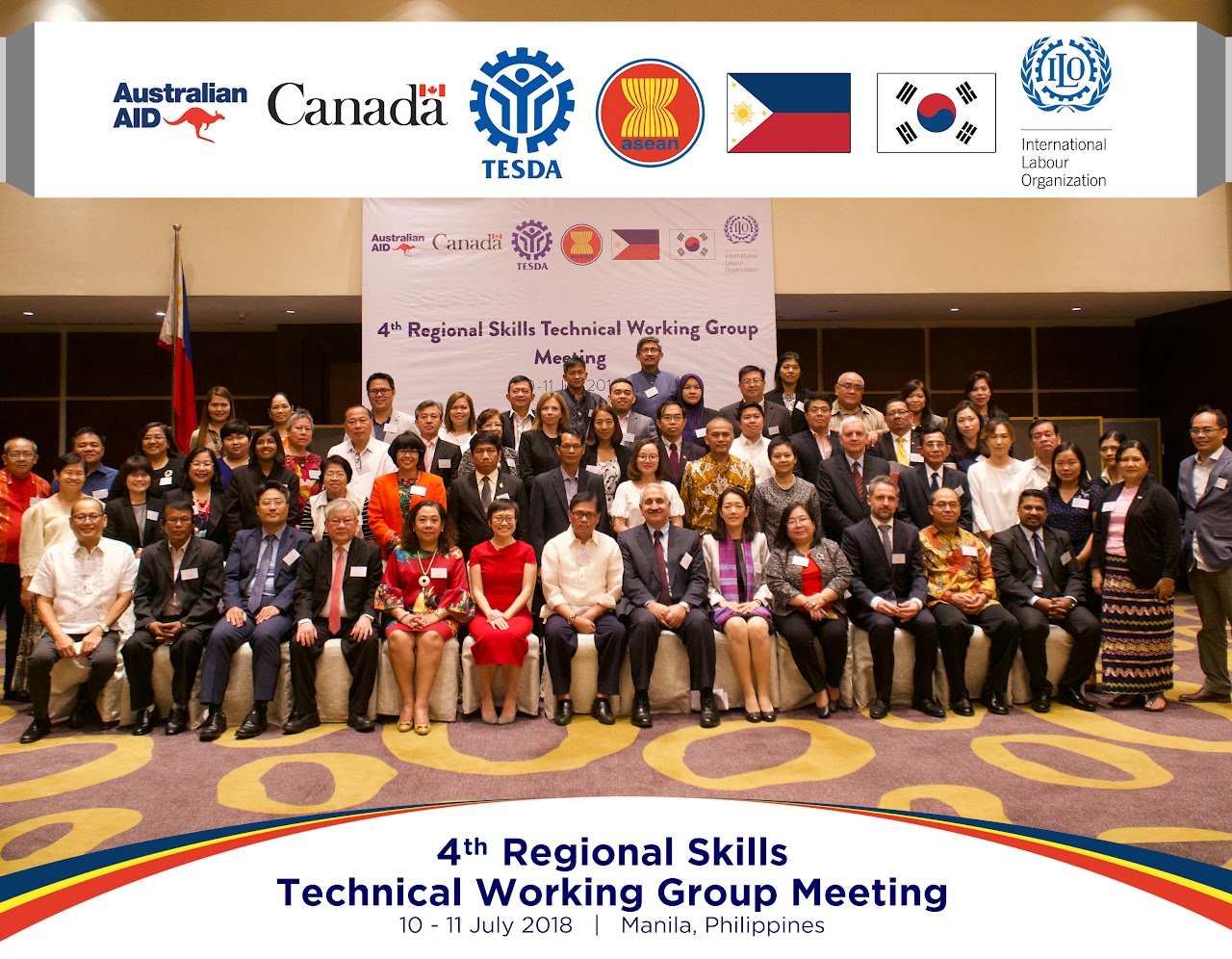
10-11th July 2018, MANILA PHILIPPINES
MUTUAL RECOGNITION OF SKILLS
The 4th Regional Skills Technical Working Group Meeting (RSTWG) Meeting
The meeting aims to facilitate a greater understanding of the evolving context of the mutual recognition of skills (MRS) implementation, sharing of experience in the strengthening of the legislative framework and institutional capacity and arrangements of the MRS and discussion on the next steps for taking the MRS forward, including the pilot implementation.
[https://www.ilo.org/asia/events/WCMS_631453/lang--en/index.htm]


